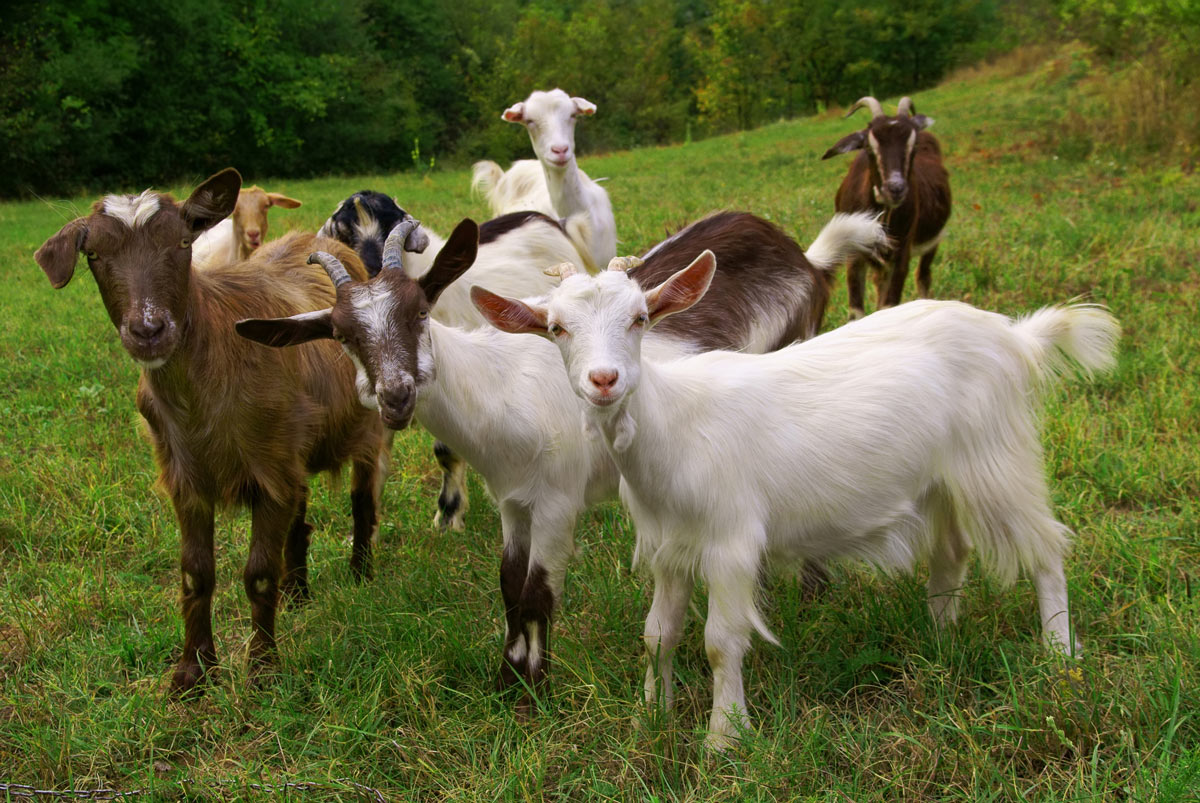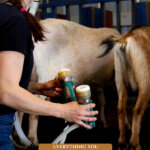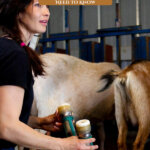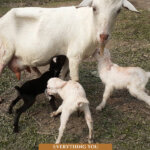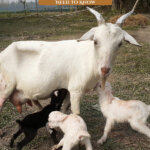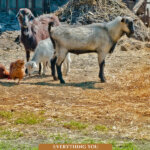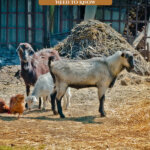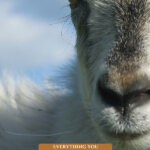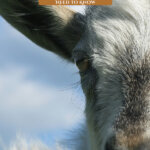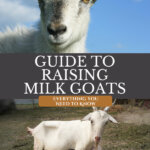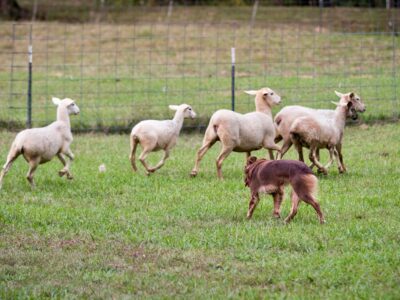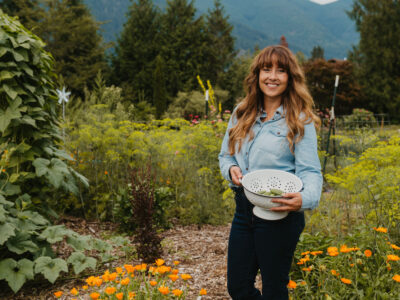If you're thinking about raising goats (for dairy, meat or as a pack animal), you're in the right place. In this post, we'll be covering everything you need to know about raising goats for a successful journey.
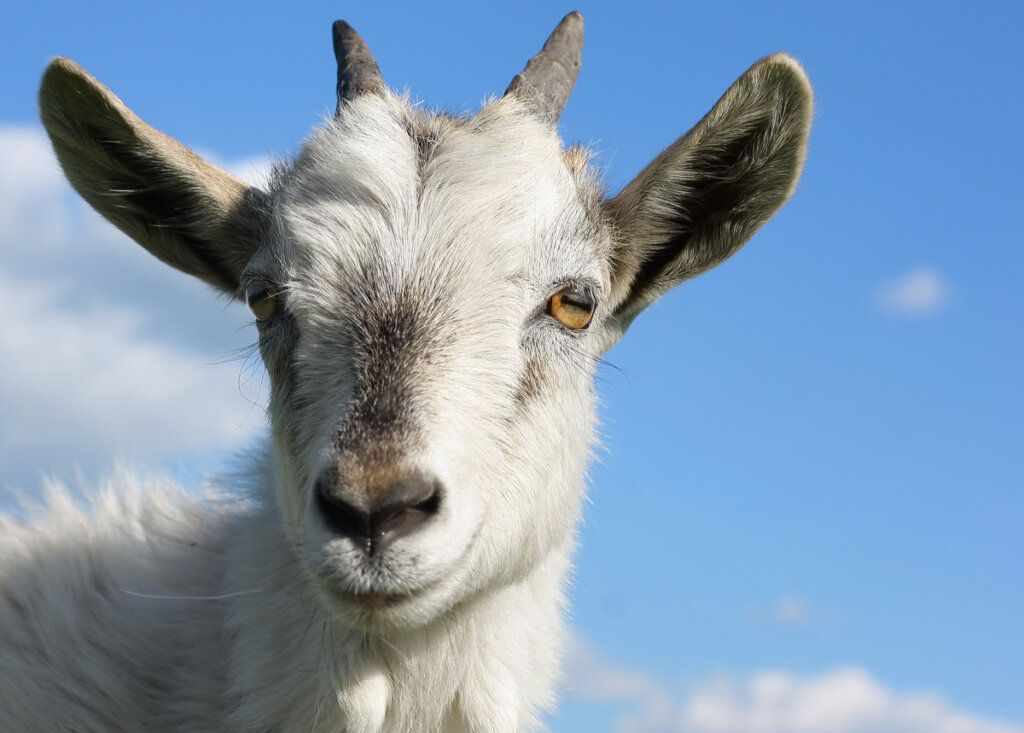
My Journey With Goats
It's true that I don't currently have goats on the farm. However, when I tried keeping goats in the past, it was an utter failure. I wanted some goats to help clear brush away from the pastures that were creeping in, but I had more issues with the goats head-butting me and escaping than progress with the brush.
After my interview with Marc, I may be convinced to give them another try!
This post has been updated with my recent interview with Marc Warnke (#433) and still includes my interview with Rachael Tuller from Lost Peacock Creamery (episode #319). Both of them are a wealth of information when it comes to all things goats.
If you're thinking about getting or already have goats of your own, this post will be extremely informative.
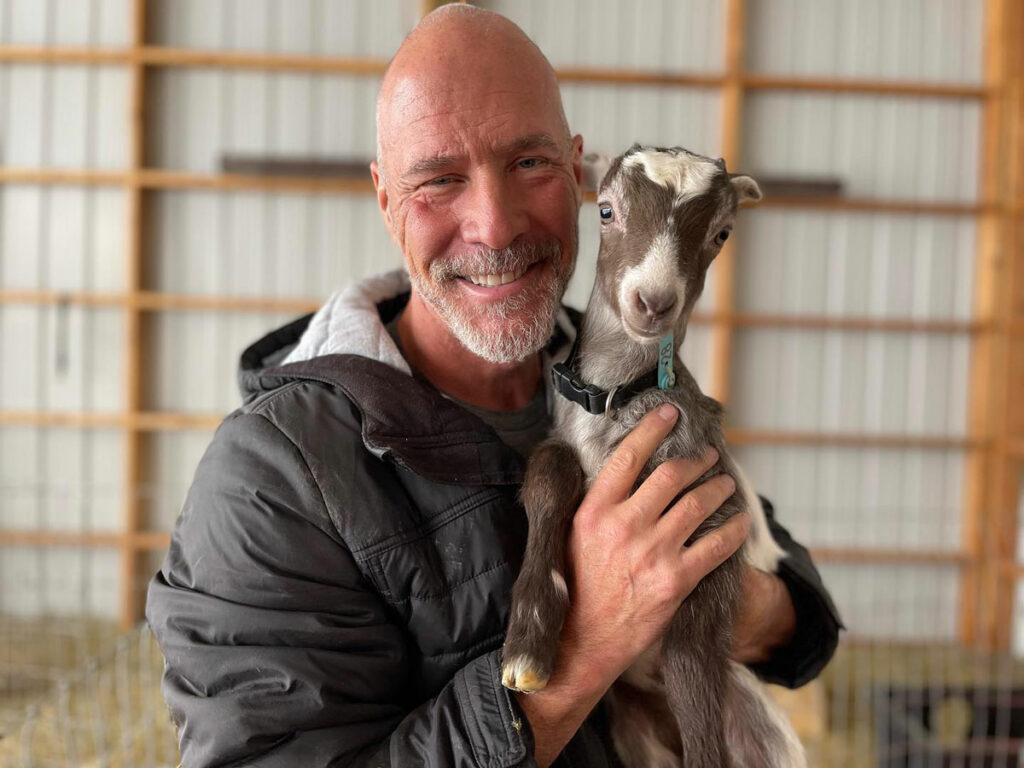
About Marc
Marc Warnke has been raising goats for milk, packing, pets and meat now for over a decade. He is known globally as “The Goat Guy” and his profession is homesteading, raising goats and teaching others to raise goats.
He lives in Boise, Idaho, on Ripple Ranch with his wife Tricia. They enjoy working the Ranch with the goats to create a global example of sustainable ranching.
Marc is the author of two books, the most recent of which, Modern Goat Packing, is now available for pre-order. The BBC has featured Marc in several documentaries and a current long-form documentary by Director Barlow Jackobs.
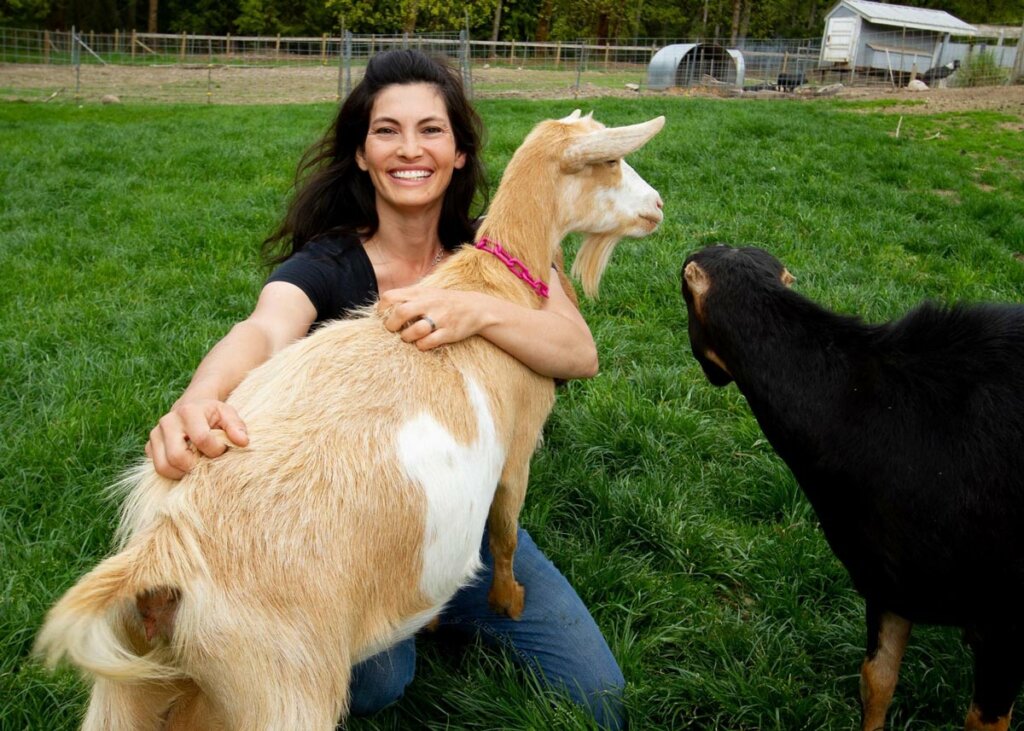
About Rachel
Lost Peacock Creamery is run by one strong-willed, outrageously over-the-top, everything-looks-better-in-pink woman; one very opinionated, get out of her way she’ll show you how it’s done 7-year-old, one tough as nails (you’ve got to be with an older sister like him), tiny little mister; and one incredibly kind, patient, resourceful and really really ridiculously good looking man.
As a Grade A Goat Dairy, Rachel and her husband are conscious of how their presence impacts the environment, and they're proud to be a Thurston County Green Business. They milk 44 goats twice a day and make cheese three times a week.
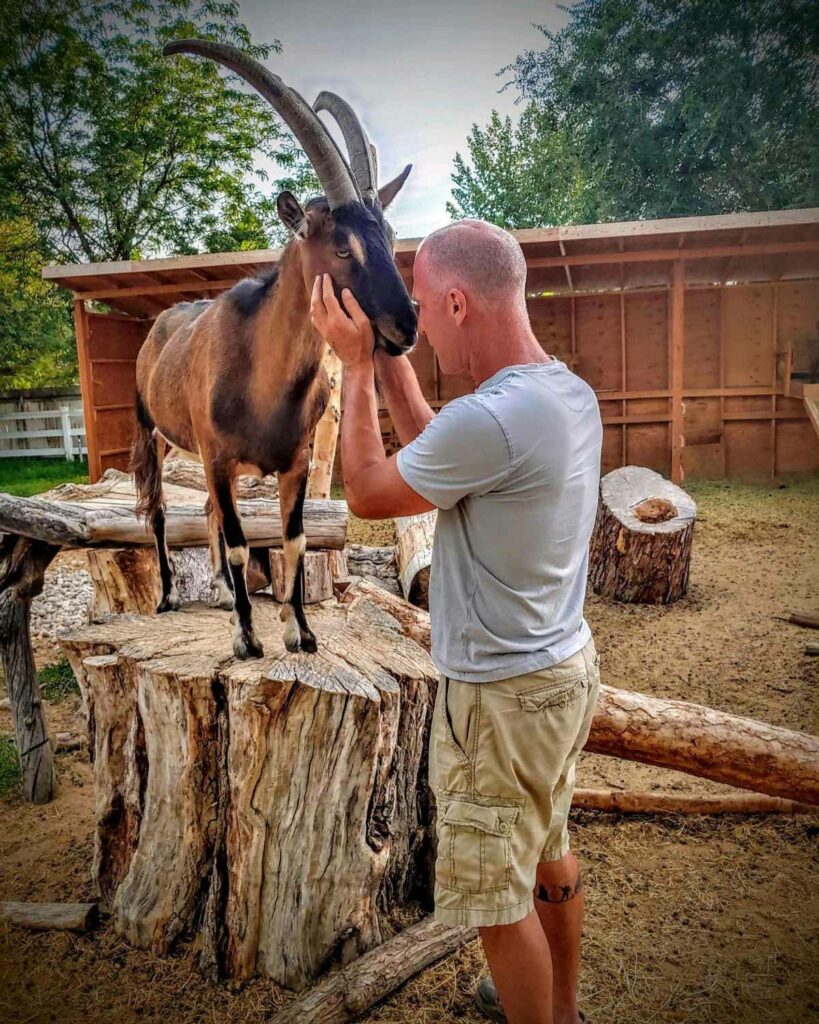
Raising Goats
One of the reasons most people choose to raise goats is for their milk. Some people have allergies to the casein in cow's milk and find that they can drink goat's milk with no issues or reactions.
Unfortunately, goat's get a bad rap and, as Marc refers to them, they can be the “red-headed step-child” of the livestock world.
In my case, I got goats years ago to help clear the brush in certain areas of our property but found that pigs were much more efficient and easier to keep in, and they gave me bacon!
If you love food, you will absolutely love goat's milk for making cheeses, yogurt, and other incredible dairy products.
Are Goats Hard to Raise?
Whether or not goats are hard to raise is really based on the type of goats you get. There are some goats that are just naughty and hard to deal with, whereas there are other goats that are much like friendly dogs. They'll cuddle and snuggle, yes they'll get out whenever they can, but they can also be very loyal and kind.
Marc mentioned in his podcast that it's all about the training. Goats are naturally aggressive toward each other. This is not only how they play but also how they find their pecking order in the herd. He says it's imperative that you never manhandle them, or they'll think it's OK to reciprocate this behavior.
Fencing Requirements
No goat is without its flaws. If they get out, they will eat through your yard and garden, so being prepared with adequate fencing is key before bringing the goats home.
Just be prepared, even with the tightest fencing, goats somehow, someway tend to find their way out. There's a saying that if water can get through the gate, so will a goat!
Marc recommends field fencing or electric fencing (or a combination of both). He prefers horse paneling, which is a 2×4 square, because the baby goats can't stick their heads through and get stuck by their horns.
You also want to try to keep the goats off the fence. Goats will climb on anything, trying to get to forage on the other side. He also mentioned that goats will want to rub on a fenceline when losing their fur. Marc recommends a strand of electricity at about mid-level and one at the top of the fence so they can't stand on top.
Marc says goats respect electricity like no other animal. Once they know a wire is hot, they'll leave it alone.
Beyond fencing, you may want to consider a herding dog to help out. You can learn more about farm dog breeds in this blog post and podcast interview.
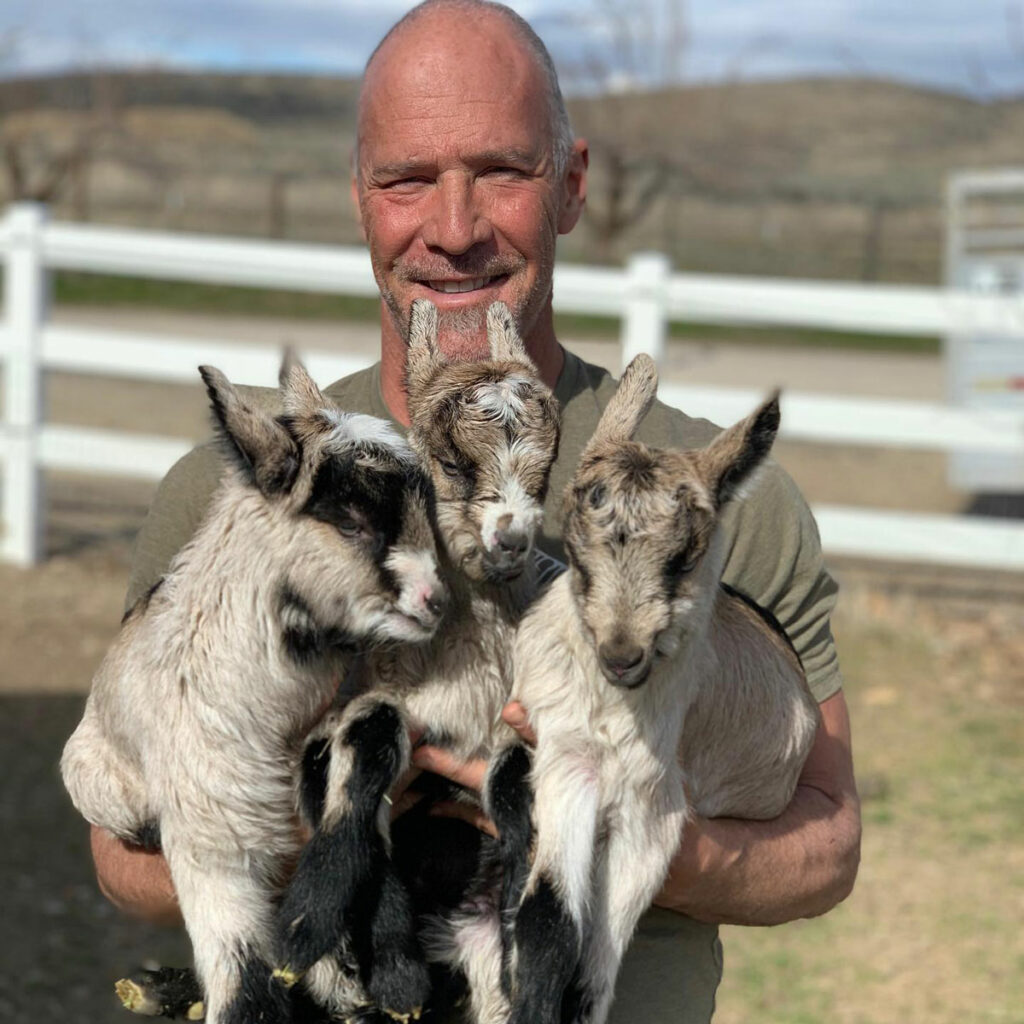
How Many Goats Should You Raise?
Goats are herd animals and will do best in pairs. However, goats will also bond with a chicken, a horse or a cow if they don't have another goat friend (however, they do prefer a goat buddy).
If you introduce a new goat into a herd, it's ideal to bring in two goats at a time. If you bring in just one, the rest of the goats will ignore the new goat, and it will never fit into the herd.
However, if you have to bring in only one goat at a time, Marc recommends taking an existing goat from the herd and isolating it with the new goat in a pen until they bond. Then, you can reintroduce the pair to the rest of the herd.
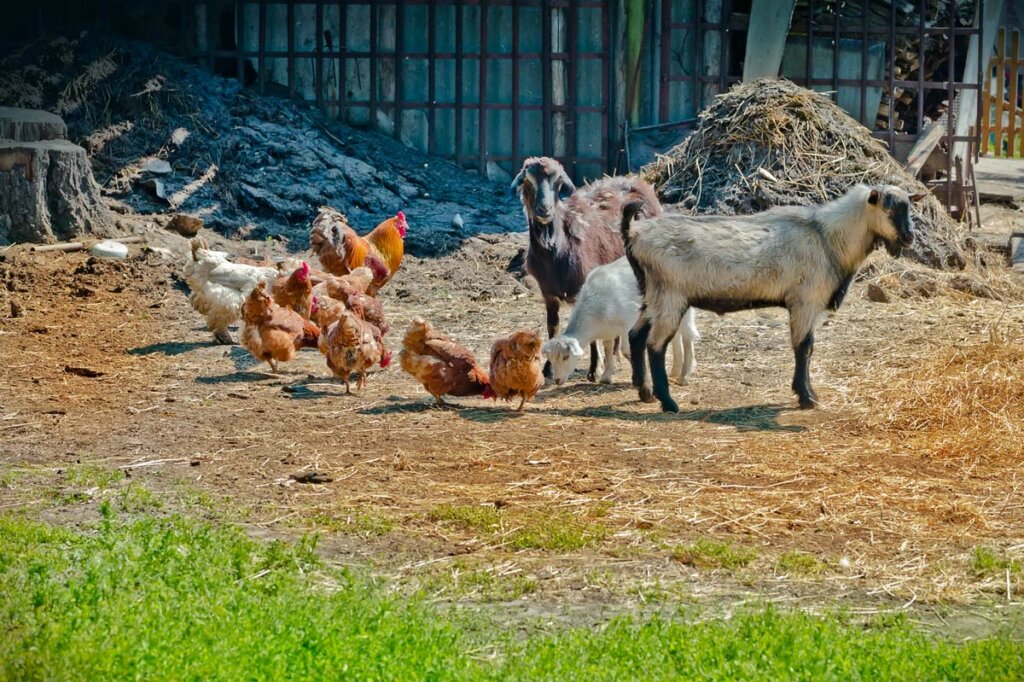
Buying Goats
Before purchasing a goat, it's important to know what you're planning to do with it. Most people raise goats for dairy, meat, or fiber (mohair or goat hair).
Once you know their purpose, this will narrow down the different breeds to choose from. After that, Rachel's advice is to choose a breed you like the look of! Goats will cause mayhem at some point in time, so if they're cute, it helps you to be more forgiving of them!
If you're going to be milking your goats, be sure the udders are shaped right for your hands, especially if you have hand issues such as arthritis.
Nigerian goat's milk is delicious and makes fantastic products, but they can be harder to milk.
Knowing the familial history of the goat you're looking to buy can be helpful. If you're able, take a look at the mom's utters; this may help you to know if the baby's udders will be good for you or not.
Goat Breeds
When getting a goat for its milk, the breed is very important. Here are some great dairy breeds, according to both Rachael and Marc:
- Nubians
- Guernsey
- Alpine
- Lamoncha
- Nigerians
- Sable Saanen
- Oberhasli
All these breeds should produce at least one gallon of milk per day. They have good temperaments and, with the right practices, will provide delicious milk.
As a tip, according to Rachel, Nigerians and Nubians are known for their high butterfat milk, and Alpines have more “salty” milk.
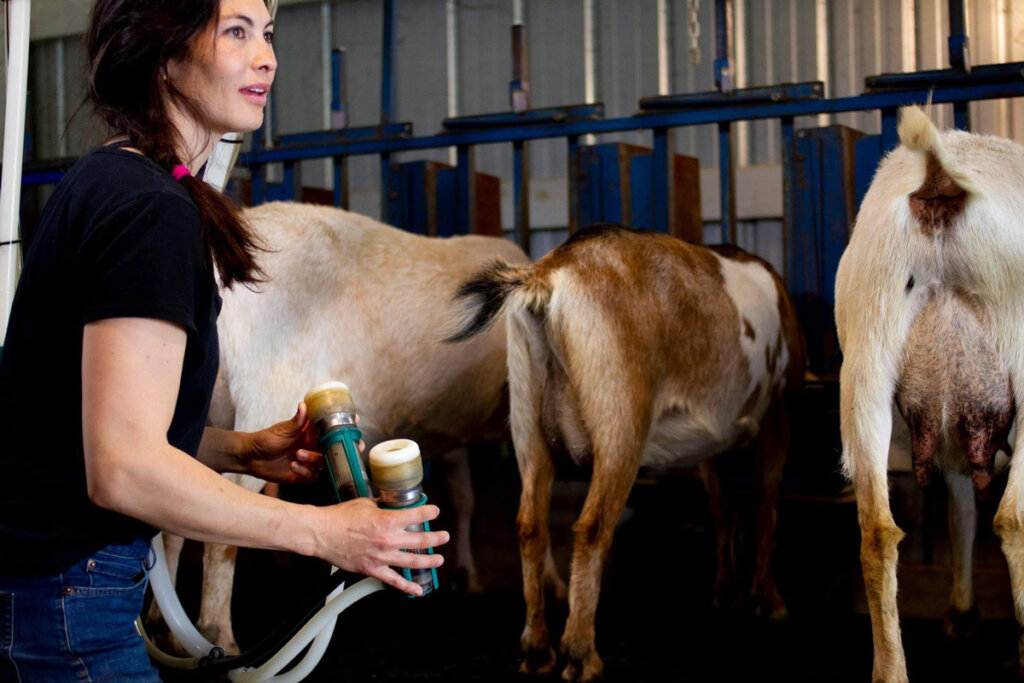
Milking Goats
Machine vs. Hand Milking
Rachael's advice when it comes to milking is to do your homework. Because they have so many goats on their farm, they use a milking machine. However, if you're working with just a few goats, it may be faster to milk by hand.
Marc said it takes him about five minutes to empty an udder, so if you're milking two goats, you're probably looking at about 20 minutes of total hands-on time.
Though a milking machine may speed up the process, you have to consider the time it will take to clean and sterilize it (Rachael shares that it takes about an hour and a half) versus simply washing your hands. Rachael shares that they don't fire up the milking machine until they're milking 11 goats or more.
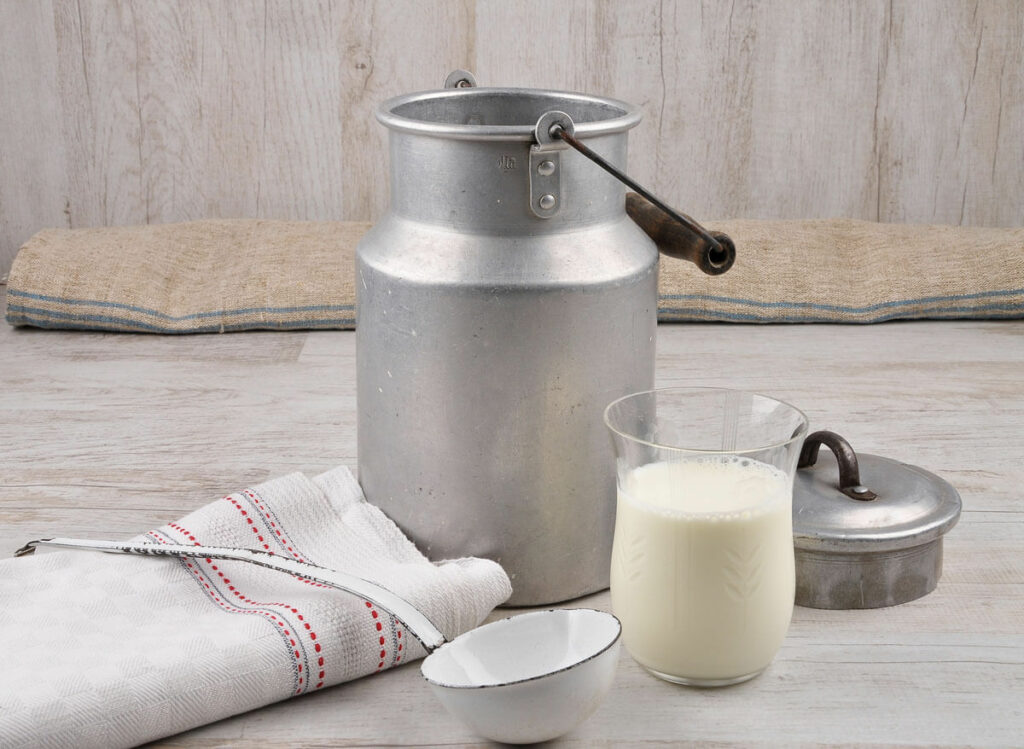
Supplies Needed for Milking a Goat
Marc milks by hand and highly recommends a milking stanchion to bring the goats up to your height. He has goat stanchion plans that teach you how to build one very simply for $15.
However, Marc also milked goats on a stool in his garden for years, in which case he says the only supplies you need are a stainless steel bucket (without seams) and a filter.
Goat Milk Taste
Many people who have tried goat's milk and not liked it say it's because it tastes “goaty.” This is a common complaint, and one Marc says can be completely controlled. He says you can make goat's milk taste nearly identical to cow's milk. So much so that someone wouldn't be able to discern the two.
How to Get Great Tasting Goat's Milk
Two important steps for great-tasting goat's milk are:
- Pre-Care – Keeping a healthy goat with good bedding and maintaining proper care is a large part of getting good quality, delicious goat's milk.
- Post-Care – Next, how you care for the goat before and after milking is just as important when it comes to the milk's flavor. Sanitizing the udder prior to milking eliminates coliforms (which are bacteria that multiply and cause the milk to taste bad) is key. Also, getting the milk down to a cold temperature as quickly as possible makes a big difference in flavor. Marc uses a brined ice bath to get his milk down to 38 degrees within 20 minutes of milking.
Naturally Homogenized Milk
Goat's milk is naturally homogenized, meaning the cream won't separate from the milk. But that doesn't mean you can't use a cream separator to mechanically separate out the cream.
Marc also mentions that he freezes all his goat milk. Because it's naturally homogenized, it defrosts wonderfully, unlike cow's milk, which can get grainy.
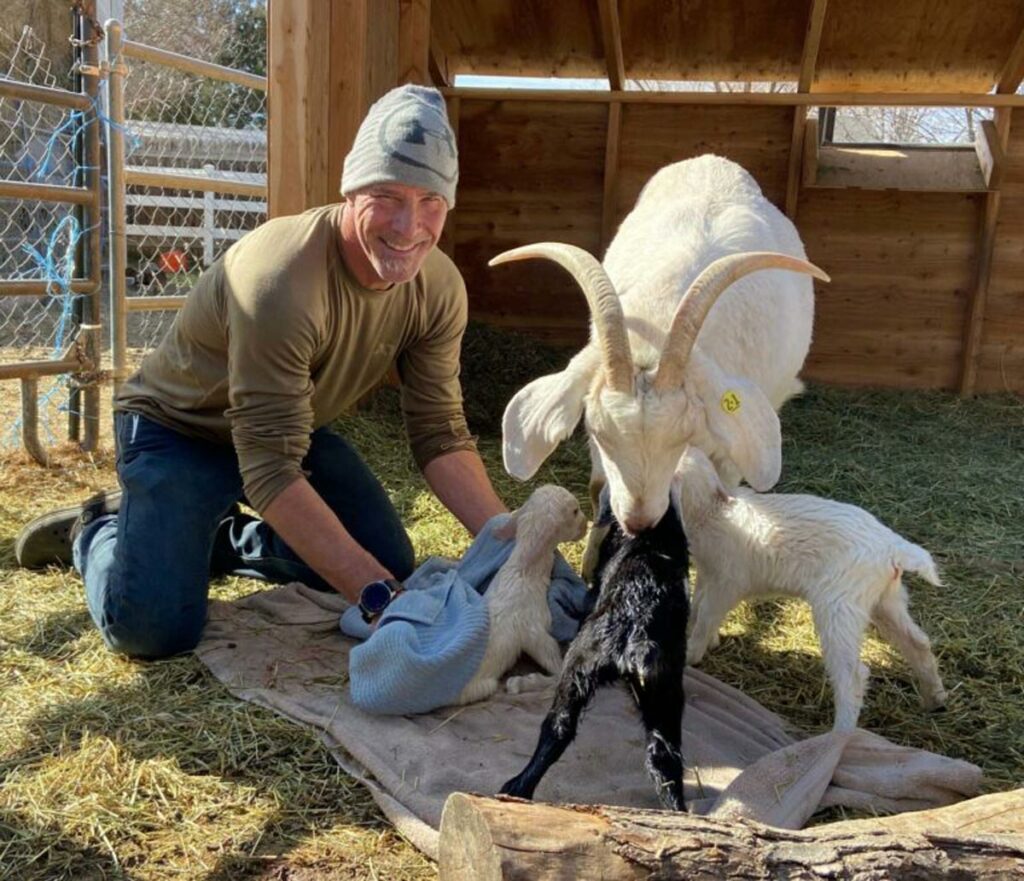
Hardest Part of Raising Goats
Rachael says 100% the hardest part of raising goats for milk is kidding season. They do all their own kidding on their farm, and it's a very taxing time with many sleepless nights making sure all the animals are safe and sound.
Last year they made a change to how they raise their animals because they want to be sure they're following ethical practices. So, if babies want to stay with mom and nurse, then they let them as long as mom and baby are both doing well.
If the babies are struggling or the mom isn't doing well feeding them, they turn the goats into bottle babies.
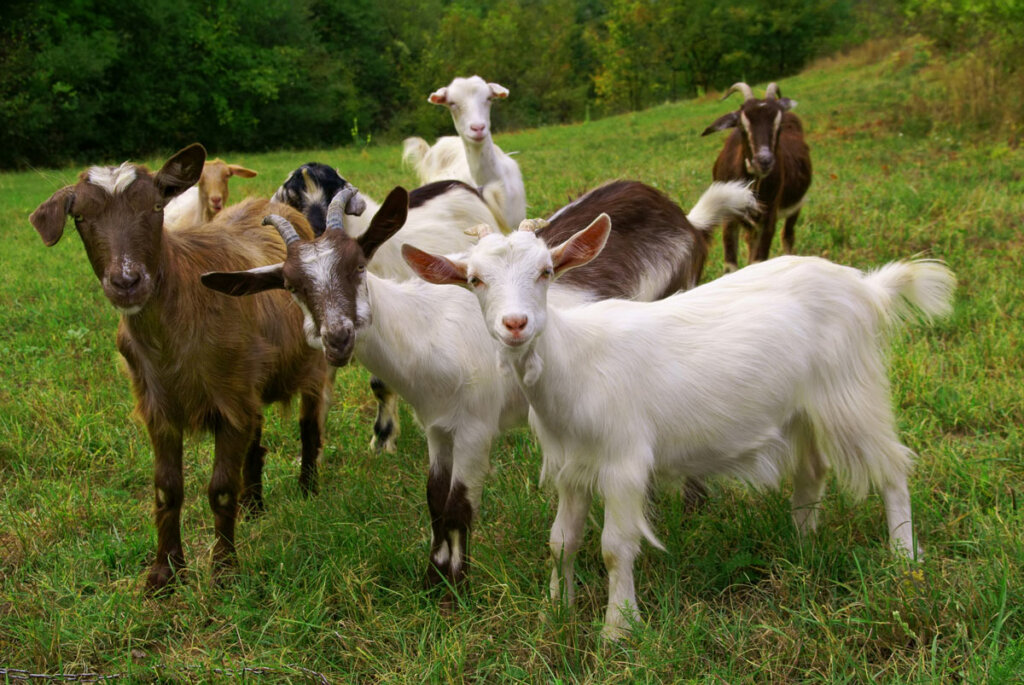
How Much Space is Required?
Because goats like to browse for their food and not graze (more on this below in the common diseases and health concerns for goats), it's more important that the land you have is able to supply their needs with the forage they like to eat.
That being said, having about 1/10th of an acre per goat is ideal. Marc says raising a goat on a “dry lot,” meaning it doesn't have access to a pasture, can be easier than pasture-raising it. Since goats require pasture rotation every 21 days to avoid getting parasites, raising them on a dry lot can be more successful.
If you listened to my podcast with Joel Salatin on maximizing your homestead, we discussed partitioning off your land to practice regenerative agriculture as well, so I highly recommend reading that blog post.
Finding a Goat Vet
Unfortunately, Rachael mentions that many vets today aren't trained to treat goats. Marc mentions that in veterinarian school, the doctors only study goats for six days! Therefore, goat owners really need to become their own at-home vets.
Facebook has many groups you can join, and it can be a great resource and community to help you out when learning how to treat sick goats. However, it may not be very helpful in the case of an emergency because you might get 10 different answers as to why your goat isn't doing well.
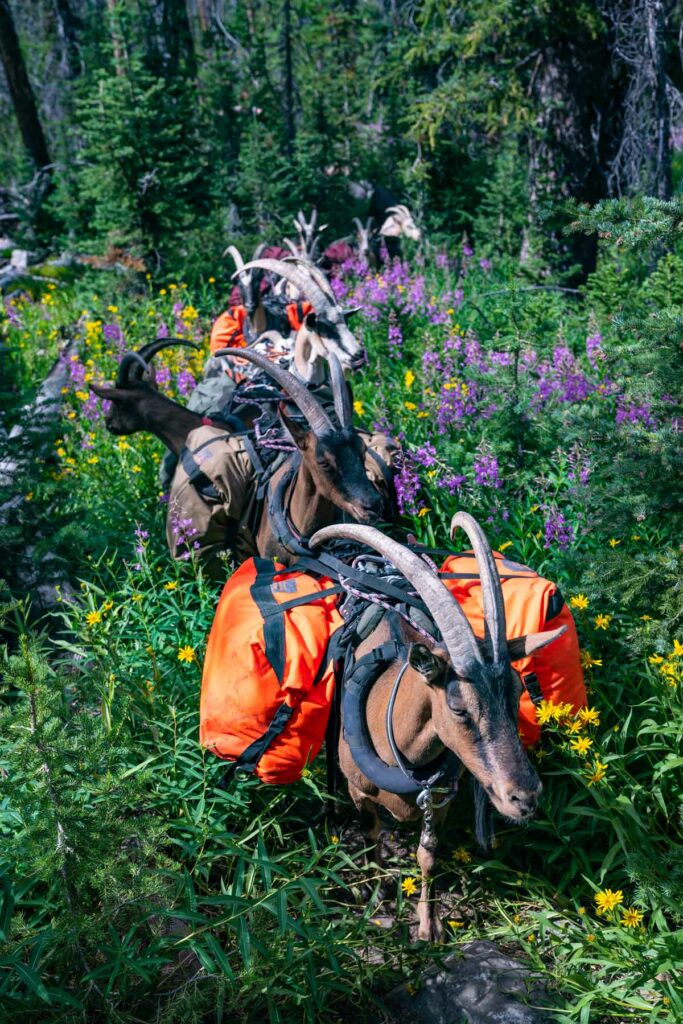
Common Diseases and Health Issues with Goats
Parasites
Rachael shares that the biggest thing to look out for with goats is parasite control. Many people say, “I want goats to mow my lawn”, but actually, you don't want goats, you want sheep.
Goats tend to graze higher up, so they'll reach over the top of fences to eat the bushes, or they'll graze the tops of high grasses, etc. But when goats are forced to graze closer to the ground, they are susceptible to the parasites that live on the ground.
When a goat gets a heavy parasite load, it can be fatal to them. There's a FAMACHA chart that helps you monitor the color of your goat's eyelids to see the amount of blood circulating in their body.
If their eyelids are bright pink, they're doing good with no threat of parasites, but if their eyelids are light pink or even white, that means there's something that's competing with their blood flow and they're in danger.
Worming only when you need to is healthy for goats and helps keep them alive longer.
Hoof Rot
Goats were intended to have their hooves trimmed and it's very important to keep up on trimmings or else they can get hoof rot (also called foot rot), which is very smelly and gross, but also not good for the goats and can eventually lead to lameness.
The best treatment is preventative, but if your goat does get hoof rot, they may need antibiotics to get it cleared up.
Hoof rot is also caused when goats have prolonged exposure to damp, moist ground, so making sure your goats have proper enclosures is key.
Poisons
Rhododendrons and azaleas are poisonous to goats. It's important to keep an eye on your goats and know what they have access to in order to keep them safe.
Goats don't know what plants will hurt them, so if you're thinking about getting goats, know what plants are dangerous to them and consider getting rid of them from their property.
Polio
Goats are also highly susceptible to getting polio, but a simple influx of B vitamins can treat them.
Knowing the common diseases and health issues for goats can go a long way in preventing illness and even death for your herd.
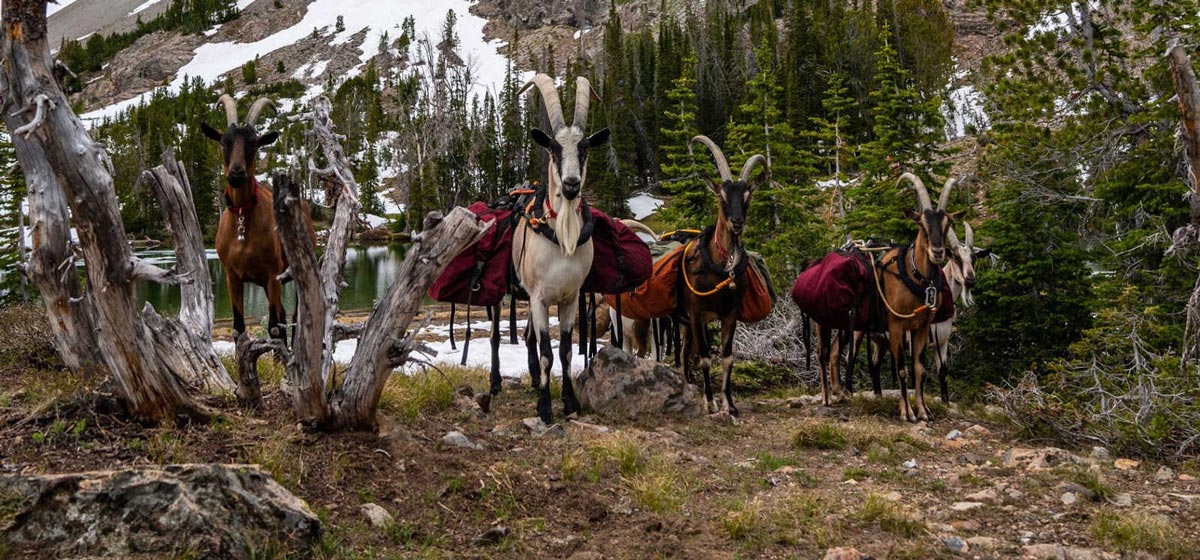
Resources
If you want to learn more about raising goats, definitely check out Marc's resources on both his website, PackGoats.com and his YouTube channel, where he has over 400 teaching videos.
Rachael recommends a few resources to help you on your journey to keeping a goat herd.
- Rachael's “Crash Course for Marketing” is an online class for small farm owners or those looking to sell at Farmer's Markets, etc. If you use code “MKN” you'll get $20 off the purchase of your course!
- Holistic Goat Care by Gianaclis Caldwell – Holistic Goat Care: A Comprehensive Guide to Raising Healthy Animals, Preventing Common Ailments, and Troubleshooting Problems – this book helped Rachael drastically on her journey to raising goats.
- YouTube – there is a great wealth of information on raising goats on YouTube. Do a quick search and you'll find all you need.
- Facebook – if you're wanting to raise goats, join a Facebook group for goat owners now and start learning from those already doing it.
- Learn by doing! – Rachael says they have learned the most by trial and error. This can be costly, but it's also completely different when you're doing than when you're reading or researching.
- Connect with Marc at PackGoats.com, on Instagram, or on Facebook.
- Connect with Rachael at Lost Peacock Creamery, on Facebook, or on Instagram.
Melissa: Hey, pioneers. Welcome to episode number 433. Today's podcast, we are going to be talking about raising goats. Now, we've had a couple guests on in the past who talked a little bit about raising goats before, but nothing like today's episode and to the depth of today's guest. In fact, he almost has me convinced to go and get dairy goats, which is a big statement, especially knowing my past history with goats, which if you've hung out for a while, you know about that and then we end up talking about it in today's interview as well, so that is saying something.
Today's podcast guest is Marc Warnke, and he has been raising goats for milk, packing, pets, and meat for over a decade. He is known globally as The Goat Guy, and his profession is homesteading, raising goats, and teaching others to raise goats. Marc lives in Boise, Idaho on Ripple Ranch with his wife, Tricia, and they enjoy working the ranch with the goats to create a global example of sustainable ranching. Marc is the author of two books, one on goats. He has been featured in several documentaries by the BBC, as well as a current long-form documentary by Director Barlow Jacobs.
Speaking of goats and sustainable ranching, today's podcast sponsor is Azure Standard. Azure Standard not only has a ton of resources to help you stock your pantry, but they also have things for animals, specifically minerals and different items for goats, as well as chickens and cattle. If you are a brand new customer to Azure Standard, you can use coupon code MELISSA15 to get 15% off your first order of a hundred dollars or more as a first-time customer. We'll have that in the show notes below, so you can go and check that out. We get a lot of our animal supplements for our cattle through Azure Standard, including the Redmond Agriculture line. They have got a lot of things under their agriculture, so make sure that you check that out, as well as your pantry staples.
Now, the first part of this interview, if you are watching this on the YouTube channel, hello rural internet, you will see that Marc's half of the screen is black for just the first minute or two, and then thankfully, he comes on. Now, if you're listening to this the old-fashioned way, you won't know any difference because all of the audio is there, but rest assured Marc does come on. So without further ado, let's get to today's episode. Okay. Well, Marc, welcome to the Pioneering Today Podcast.
Marc: Thank you. Glad to be here.
Melissa: Yeah. Well, I'm very excited for today's because now, some of my audience has heard me say this in the past and our listeners, but I actually am not overly fond of keeping goats. I like other people's goats, but when we did keep goats, to be fair, this was way back. We were keeping cattle and I had horses at that point, but we got some goats that were old goats. They'd been passed from multiple owners and they were weathered male goats, and we got them when they were quite later in life.
One, there was one male goat that would rear up and strike at me every single time I would go out into the field to move his stake or just to do anything with them. And of course, when he's reared up, he's pretty big, so we did not have a good relationship. I'm like, "Buddy, I don't have time for your antics. I'm here to help you. And if you're going to be a pain, I really don't want to deal with you." And then of course, what goats are famous for, despite having him an electric fence on a stake, they would get out and just decimate our yard and the gardens and would eat everything I didn't want them to eat. That was kind of my goat. They weren't dairy goats. They weren't meat goat. They were very old. We-
Marc: They're [inaudible 00:04:19].
Melissa: ... got them...
Marc: Yeah.
Melissa: Yeah. We got them to help clear some brush area back. And then we got pigs, and I have to say, the pigs were much more efficient for me and I got bacon, so I have not went back to goats. We've stuck to the pigs and the cattle and the chickens and the ducks, but I have visited other people's dairy goats, and they were very nice. So I still hold a slight grudge, I have to say.
Marc: Yeah, no worries. Yeah. I get it. Those are two of the things, if people are set in the right direction, they'll never have to deal with. Goats are consistently a misunderstood animal by agriculture and human beings because they're kind of the redheaded stepchild of stock animals, right? Science doesn't commit any money to them because you can buy a new goat for 50 bucks, so they don't have any value. If that animal was worth a thousand like a cow, then all of a sudden, we would have science and research. But the trendsetter for the understanding of animals is agriculture, and because agriculture looks at only a female goat being of value or a one-year-old wether as a butcher-weighed animal, don't forget the animal you owned, science has never studied how to keep a goat alive over one year that's a boy. Right? They don't know. Not only do they not know, they just guess from other animals.
Remember, goats are incredibly sophisticated and one of the most intelligent animals on the planet. So now, you got super high intelligence, so you have a very complex social and intelligent structure, and then you have an animal that's the most utilized stock animal on the planet. And the only country in the world that's forgotten is America. We're the only ones that forgot. Why? Because we're rich and we can choose to feed animals on a monoculture level rather than a foraging level, and goats can just get by on cheaper ground. That's why the rest of the world utilizes them, is because they can get by. It can take up to six days for the digestive track of a goat to have food go in its mouth, and then come out its butt, so it utilizes so much of the nutrition and translates that into things like milk and meat. It's an incredible resource, but we've forgotten its value.
The two issues you struggled with are super easily solved with a good fencing strategy and proper raising. Goats will get aggressive if you manhandle them. So if you grab them by the horns, you teach them at an age, you can't treat a goat that way because they communicate with one another that way, and you have to show them that you're only the show of love. So we teach people when they're working with their goats that the only reprimand is a squirt bottle or a loud voice, and we put them away from us, and they learn through a disassociative reprimand how to be trained because they're complex. You can't rough them up.
If you rough them up, they think it's fair to rough you up or small human beings and everything else. So aggressive goats are created by rough handling at a young age, which a lot of people think is okay. It doesn't work with goats. It's too close to play. It's too close to aggression. They're very complex. And then they think, "Oh, cool, you're a goat too. I get to play with you that way." And then he's 200 pounds and that's a problem, right?
Melissa: Yeah. That's very interesting because one, like I said, near as we could tell, they were about eight years old. We assume just from word of mouth, and the people we got them from had only had them for about three months, so they'd been moved a lot. But what was really interesting is that goat would never do it to my husband, so he's like, "I don't really know what..." So I was assuming it was an alpha female type thing.
Marc: No. It's that he learned-
Melissa: No?
Marc: No. A lot of times, it's the lowest goat in the pecking order that also shows aggression to small humans because everybody else is kicking his butt all day long. There's a saying in goats, which is goats don't have goat friends, and they don't because they'll go to the feeder, two buddies, twins, and one will beat the other one off the food. Just the same pecking order that seems confusing about chickens but highly developed in goats. So there's this intricate pecking order and you're following into that. When we bottle-feed a baby, they think we're a goat and they think they're a human. We really bond them at one day old to us, so they're super easy to handle, and they're like a imprinted baby bird literally. So we have to interplay with that.
But listen to this, I milk 12 gallons a day twice a day, and I'm on my milking stand between myself and my hired man. Four people can go out and say, "Glitter, Mocha." Two does come right to the gate. We open the gate. They get on the stanchion. The other two does that are on the stanchion get off and go out. We never touch our does in the milking process except to deliver love. We don't have to rope them. We don't have to drag them. They love what they're doing when they're handled well, and it's a beautiful exchange between a human and a goat. I mean, you missed the complexity of the beauty of that animal. I call them an anointed animal, an animal chosen by God that humans are supposed to coexist with. It's the perfect milk. It's the universal milk. I mean, there's so many miracles about this little animal that I can tell you about, and I will twist your head back. They are an amazing critter.
Melissa: Okay. Well, let's back up a little bit. Four dairy goats specifically, benefits of dairy goats, and then we'll get a little bit into requirements for keeping them.
Marc: Okay. Benefits of dairy goats?
Melissa: Yeah.
Marc: Okay.
Melissa: Well, why keep a dairy goat? Yeah. Why would you want to keep a dairy goat? Obviously, for the milk, but a little bit beyond that. Yeah.
Marc: Sure. I rank goat milk as one of the top three foods on planet Earth to put in your body. And that's not me. That's ChatGTP and all the research. So as a proof point to that, actually, before what we did, I put together just a list from ChatGTP. And it'll make it less organic if I'm reading, so I'm just going to go from memory and hit the high points. Number one source on the planet of medium chain triglycerides. Those are MCTs, the same thing that's in things like bulletproof coffee. Most people assume the number one source on the planet of MCTs is coconuts. It's not. It's goat milk. So goat milk is the number one source of medium chain triglycerides. That alone is massive. It's a fat carrier molecule that brings in live enzymes and live microbiomes. It's like putting a supercharged subway in your body in these little fat molecules that only exist in certain things, and goat milk has tons of them.
It goes directly through the stomach, into the brain, into the vascular system, and carries with it super hard things to get like bioavailable magnesium, bioavailable selenium. Selenium is a massive missed mineral in human diet. You also have the perfect mixture of protein and fat. Every animal on the planet can drink goat milk and thrive, including humans. The only closer to human milk is camel milk. You have also a live microbiome, so the gut health aspect. My customers that drink my raw goat milk, instantly, if I get two gallons of raw goat milk in them, their body will demand them to come back and get more, and the goat milk I make tastes amazing. It's so easy to make it taste good and I can show people how. It's so good.
That's the value of goat milk, so why have a dairy goat? So you can access the top food on the planet right out your back door, a gallon a day. I drink three quarters of a gallon a day. I've had four glasses already and I eat one meal a day. I'm 54 years old. I'm ripped. I'm literally ripped, and most of my calories are goat milk. I take my nutrition super serious, and if people do, I can tell you goat milk should be a cornerstone of their diet. Now, as far as care, do you-
Melissa: Yeah. Yeah. Let's first start on space requirements because some people have large acreage and some people that just have backyards, et cetera. I always like to say what is the ideal space requirements? And then what can you get by on before negatively impacting the animal?
Marc: Right. Surprisingly enough, I would say it's about one-tenth of an acre per goat is just a good rule of thumb. You have to remember, when you dry lot a goat, you actually can be more successful at raising them, than pasture raising them because that's an advanced strategy as well. That's where a lot of people go wrong, is that you have to rotate your pastures every 21 days with goats to help with parasites, so most people misunderstand. And don't forget, they choose grass as the lowest rung of something they're going to eat, so if you don't have the pasture with eight different varieties of browse, forget about it. Just dry lot them. And when you dry a lot them, then you can control their food, their mineral, their water, their bedding, and you're going to have a more successful strategy raising goats. I can teach people how to use pastures. As far as space though, my goats have access to five acres all the time and I have 41 goats, and they live on about an acre by choice.
Melissa: Okay. So for dry lotting, for someone who's new, can you explain what you mean by dry lotting? Yeah.
Marc: No access to a pasture. No access to a pasture. They're literally being controlled in their food, and they're living all on one place without access to pasture or forage.
Melissa: Okay. Perfect. When we're looking at goats for meat, for dairy... Actually, we haven't even gotten in too much, but you also do pet goats. Do you have a favorite breed? Can you do this with dual purpose? Is it better to strictly go for a dairy breed goat, if that's your main goal? Kind of walk me through that process.
Marc: Yeah. People come from all over the country to get babies from me. I'm a fully functioning raw goat dairy and breeding operation. I've been breeding and trying to build the perfect back goat for over a decade. We are returning a goat back to its natural origin, and the great part is that we are in our hybridization. We're creating a more resilient milker and liver because we're not linebreeding. Linebreeding eliminates genetic diversity, and when you hybridize, you get hybrid vigor. So I've invested myself more in the goat's overall health and well-being and using hybrids to create udders and conformation that I like to use within my operation. So we're experimenting with this. Gosh, I went down a rabbit trail. Will you remind me where I was trying to go? I apologize.
Melissa: Yeah. No, that's okay. Hybrid vigor. We raised grass-fed beef cattle and kind of the same, we are playing with hybridization with the Scottish Highlands versus some of our Hereford-Angus cross. So when you started talking about it, I'm like, "Ooh, this is really fun." But yes, that's more advanced when people are looking in breeding, so if someone is looking for a breed of goat that's best for dairy, what would your top picks be?
Marc: Where is the crossover? Multiuse. The dairy breeds are really kind of one of my cornerstones because they translate well to packers and they translate really well to milkers. They do both sides of that. And because I know their personalities so well, that's one of the things that's made me uniquely able to understand goats better, is that I do 500 miles a year and 70 days in a sleeping bag in remote backcountry with my herd of goats, including milkers. So I'm living off with my packers off the land. I'm learning their mannerisms. They're reliant on me. I'm a functioning part of their herd.
So what I would tell you is that dairy goats have a gentle way in certain breeds, and if you want certain sizes and certain gentleness, there are certain breeds that I recommend like Oberhaslis or LaManchas or Sables. If you want those higher horsepower, larger productions, that's things like Alpines. And personally, on the homestead, if you want really easy-to-work-with goats, stick to those complacent breeds, Saanen, Sable, Oberhasli, LaMancha, very gentle, kind, nonaggressive, easy goats to work with that'll do everything, including the wethers making meat. I have learned how to cross meat and dairy, putting a Boer with a dairy goat, and I can get, listen to this, a 200-pound baby in 12 months. I can grow faster than pigs. Did you hear that? That's big.
Melissa: That's pretty impressive. That is.
Marc: That's big.
Melissa: It is worth raising goats then for meat. I mean, there's enough literal meat on them to be worth a while as a meat animal.
Marc: We're the only country in the world that doesn't. We're the only country in the world. North America is the only country in the world that doesn't eat goat as a primary meat. They're fabulous. Now, my problem is I dig a good rib eye, so would I ever eat just goat? No because I like a big fatty rib eye and eat one almost every night. But is goat a fabulous meat for a family? No question. Ask yourself this, why is it illegal in San Francisco to have two little Nigerian Dwarves that give me milk in the backyard? They're quiet. They're not dangerous. They'll walk with you as a pet. But it is legal for me to have three barking predators with stinky poop. How is it possible that dogs are legal in my backyard, and two little dairy goats that can contribute aren't? Chickens are now.
Melissa: Yeah. Some of the laws that we have on our books and ordinances, I could not tell you how on earth they came to be. So it makes one question that is just common sense at all within society, but that's a whole another podcast, right?
Marc: It is. It is. Yeah. Yeah. Food sovereignty. Yeah. Yeah. Go ahead.
Melissa: Yeah. Okay. If you are breeding for dairy and not mixing a buck for meat, would you get any type of meat? Say your dairy animal was bred to another dairy goat, and you have that baby and obviously it's a buck, it's a male, so you wether it. What would your meat return look like at a year with that, by half or just kind of varies?
Marc: Usually, a standard person who's not throwing huge amounts of feed and using an advanced strategy, just raising their baby goat out of my breeding crossed with meat will be in about 150 to 200-pound range, somewhere in there by 12 months old. That's going to be butcher weight.
Melissa: Okay. Awesome.
Marc: Which is a lot.
Melissa: Yeah. No. Actually, I'm a little surprised at that amount, to tell you the truth, in a year. I'm like, "That's really good." Back to the bucks, I mean, what are the benefits and the drawbacks to keeping a buck on your property for breeding purposes? Do you really need to have a certain amount of does to the buck ratio? Or just walk me through that process.
Marc: I personally don't keep bucks on my property. I use a breeding strategy where I'm always producing a breeding buck within my own genetics, and then pulling in outside genetics when I need to mix in new stuff. The beautiful part about a goat is it can breed when it's four months old. So what I do is I actually raise up a buckling for the year. I'll pick five, and then I pick the one that I like the most out of my five, and then I'll breed him to does. Or if I want to accentuate my others, as soon as they're done breeding in September, they're about nine months old, I castrate him and then I turn him into a packer for me, but people could turn them into a meat goat or a pet.
Melissa: Okay. How long is gestation period of a goat?
Marc: 150 days.
Melissa: Oh, okay.
Marc: Yeah. We like to breed late November, December because we like those babies to hit the ground in the late spring, so it's warmer. And the average goat has 2.4 babies, so they're quite productive too. Think about it. I have way more triplets than I do singles, so when you add a third axis, now all of a sudden, you get geometric progression with those growth rates because when I can hit three babies on the ground and get those growth weights, the only thing that can produce me is a pig because she's going to have more babies. Right?
Melissa: Yeah.
Marc: So if you think about it, that's in the factor too. That's why they're a better choice than a cattle is, well, a cow as well, just because they'll produce more for the average unit.
Melissa: Yeah. That's really interesting. Now, I'm guessing probably not as much just because we've talked about goats are severely underutilized in the US, but if you didn't have a buck or you were looking for new genetics, is there any type of AI programs out there available for those?
Marc: Yeah. Yeah, totally, but that's for the fancy farmer. I mean, you can do that and that's super good, but there's so much great almost older genetics that are out there. I mean, there's a breed of Spanish goats out of Texas that for 50 years has been thrown out there, no worming, no hoof trimming, no assisted birth, nothing. It's a herd of 200 goats that spit out 400 babies every year and they go catch them, and they live in Texas. So you have to remember the range of ground that they can live on. There are people who are really doing exceptional things. Now, I know how to grow goats big. I know how to play the meat goat business, and I teach people how to do that, but at the same time, it's translatable. So that's the only sector I don't feel like a complete expert in, but our whole thing is...
You have to remember homesteaders last year voted on the most difficult animals to raise on a homestead. Goats were number two. You know why? Because there's no resources. There's no help. And if you go to Facebook and go, "Hey, what do I do about this," you'll get 15 billion answers and eight people arguing about who's wrong? There's no good resources, so that's why we built Packgoats.com, is to have courses on helping people build a milker, helping people raise a baby, helping a goat have a baby. That's the one.
I'm telling you the heartbreak that I get. I get emails from all over the world all the time, and the heartbreaking is moments of birthing. Helping a goat have triplets is hard. It's hard for her. She doesn't know what she's doing. And if you think at 3:00 in the morning, a vet's going to show up, he ain't. You need to know what to do. So that's a course. I literally tell people it's free if you can afford it. Please save yourself that heartbreak. It's 70 bucks. A vet bill is $280 to start. So get some education. Learn how to raise these guys, and I promise it's super simple if somebody shows you, but somebody's got to show you.
Melissa: Yeah. Well, to your point, Facebook is one of those love-hate relationships, right?
Marc: Oh, yeah.
Melissa: Sometimes you can get some really good help and advice there, and other times, especially when you don't know yet what you don't know and don't have that discernment, it can be a scary place.
Marc: Yeah. It's super important that people know this, veterinarians. I'm not here to throw veterinarians under the bus at all. They're beautiful people. They don't make very much money. They're super overworked. And everyone that shows up to my ranch, I make them a sandwich. They are kind people trying to do their best. But the reality is a large animal vet showing up to your door to work on your goat took six days in school, six. That's how little we value goats. And if you go into a stock supply store, the stock supply store clerk is going to assume, everybody else assumes that the closest related thing to a goat is a sheep and it's not. It's a cow. So if you're trying to mix things that you give them, you select cattle stuff because cows have so much research in science that we actually borrow their drugs to work for goats, and vets can't prescribe that stuff. It's off-label, right?
So they come and they say, "Oh, your goat has coccidia." Super easy fix, off-label, SMZs works all day long. They can't tell you to use it. They tell you to use CORID, which is the only thing science has approved for a goat in America, and it's awful for them. It's awful. It's the only thing they can suggest. You have to give them vitamin B shots, that they don't fall into goat polio. It's so hard on their systems, and that's our number one recommendation by vets. It's like that. That's why we have to bridge the gap in this company, and that's what we're trying to do.
Melissa: Well, that is wonderful and I'm with you. My heart goes out to the large animal vets because there's so few of them left. I mean, 20 years ago in my area, we had two or three to choose from, and now, there's only one large animal vet clinic and there's three that are sharing different days to just keep it going. Yeah. There's a lot more small animal vets, of course, like cats and dogs. They're all over. And I don't think that a lot of people don't know until they get into agriculture or keeping animals. They don't even realize those vets don't treat your livestock animals.
Marc: No. No. Well, not only that too, the availability of the Rx nowadays. Now, we got to get prescriptions for everything. People who are new to this don't realize, that just showed up two or three years ago. I used to be able to go to the stock supply store, buy penicillin, SMZs, all that stuff. So I teach people how to build a relationship with vets because between our programs, if you could just access a few... So I teach people have medicine cabinet, how to build a relationship with a vet, and then have the couple chemicals in their medicine cabinet, that if they have a problem, when they call me, I don't have to say, "Okay, do you have any antibiotics?" "No." "Okay. Now, you need to call a vet..." And hopefully, he shows up to your baby who has about four days to live without an antibiotic. Do you know what I mean?
Melissa: Yeah.
Marc: That's how it is, so we're trying to help people to be preemptive and learn that stuff.
Melissa: Yeah. Yeah. No, that's good. I mean, this was kind of a side note, but really with goats obviously, but really any large animal if you've got them, to get established with your large animal veterinary clinic in your area before you ever need them, that is really key. Yeah. So great point there. Going back to the goat milk, however, because I find that very interesting. I didn't know actually some of those stats that you shared on goat milk. I actually happen to love goat milk cheese. I love the flavor. It's my daughter's favorite. She loves goat milk cheese. But goat milk itself to just drink has kind of a bad rap. A lot of people say, "Well, it tastes goaty." So one, why is that, and is that something that can be altered by the way that you handle the milk or that the goat is being fed, raised? Can you prevent it from having that goat taste to the milk or is that something that you're going to kind of develop your taste buds to?
Marc: Nope. You can absolutely make goat milk, so you almost can't discern it between whole cow's milk at the grocery store. Remember, it's naturally homogenized, so it has really small fat molecules, so the cream doesn't separate. You sometimes will get a thin layer of cream on the top, but it's actually quite hard to harvest the fat out of which is its magic. Right? So things like butter, things like cheese, if you do a gallon of milk, you're going to get a little hard ball of cheese, with a whole bunch of delicious way that you need to figure out what to do with, to swap with your pigs or do whatever.
The reason people ask that question so often is they're kindly saying, "Hey, I tried goat milk and it tasted like crap last time, but I loved goat cheese." What does that taste like? Right? So how do you make that there? So what I would say is that as people see or become aware of the value of goat milk, there won't be any fight because yes, I can teach them how to make it taste amazing just like whole cow's milk, and it's all in the aftercare. So certainly, it's the health and nutrition, and we pay attention to every detail, including our goat and our people's happiness. We want our goats to be...
I milk 14 gallons a day with a homestead. Right now, I'm five months into my milking season. I haven't had one case of mastitis. Why? Just good care, good care. Healthy goat, healthy bedding, easy to take care of, and we have no problems. Mastitis can be a pain in the tail. It's all about cleanliness, so precare is really important, and your mastitis rate is indicative of your care. It's like your little measure stick. Do you get it, right? Next is postcare, how we prepare the udder, how we sanitize the surface of udder because it's the coliforms that grow in goat milk. The healthy bacteria that makes it taste bad is actually growing, so we keep that in stasis in the most low level, so it doesn't affect flavor. But a true connoisseur of goat milk would enjoy a goaty glass because it's actually more healthy because it's grown. It's more alive.
Remember, lactobacillica is in goat milk. Lactobacillica is a bacteria eating bacteria. It's a self-stabilizing agent. So it's like honey, another anointed food. So it's a hunter killer and it works once you take it in your body as well, but what it does is it makes goat milk stable. Now, I'm going to say this with caution. I'm this kind of guy. I like to experiment. I kept a glass of goat milk on my counter for three years at room temperature and then ate it, and it was yogurt. It was delicious. It actually has the capability to self-stabilize, so as it's getting more goaty and flavor, it's actually more healthy.
Now, that said, who wants to drink goaty? It's nasty to me too. It's all in the cooling process after. I chill my milk with a brined ice bath, and I can get it down to 38 degrees within 20 minutes after it's out of the udder, and then it's frozen solid the next day. It's one day fresh in my freezer whenever I want it, and it lasts a long time. And that's how I use my customers too, so now I don't have milk rotting in my refrigerator, hoping some people will come grab it. It's frozen and ready for them one day fresh. I have a freezer out here on my front porch and two in Boise, and I do 6,000 a month in goat milk sales with 14 does.
Melissa: Wow. Okay. So when you freeze it, and then thaw it... Because cow's milk gets kind of grainy, right?
Marc: Mm-hmm. Yeah.
Melissa: So does goat milks, because it's naturally homogenized, you don't get that graininess once you've thawed it?
Marc: Correct. Occasionally, I see little specs of fat molecules in it, but it's never a texture or a problem issue, but it actually unfreezes beautifully. Again, I have almost well, 80 some gallons a week of customers in Boise who have never drank goat milk, most of them, who are scrambling, and I have to tell people no, at $20 a gallon. I sell my goat milk for 20 bucks a gallon. How many of your listeners who would be a huge difference if they could just make two grand more a month? And that's what I teach in homesteading, is that if you can learn how to make your homestead make some money, then you get the greatest gift, which is a hired person. Now, when I have somebody else who I can rely on to do the daily things, now I don't have the golden handcuffs of my homestead. I actually get to go on a trip every now and then, and go in the backcountry. So I teach people to not have their homesteads own them, but for them to own their homesteads, and to have at least produce enough profit through something creative.
Remember, the city people want what we have desperately, desperately. Fill them with love. Bring them to your ranch. Be kind. Be grateful. Give them some goat milk. Give them some vegetables. I think it's homesteaders who will be part of changing this problem we have, through using a stewardship of land. It's our gift. We're a small portion of the world that owns land. We should share. We shouldn't look at it ours. We should look at it as ours. Right? That's kind of how I approach things in everything.
Melissa: Yeah. Well, to that point, not only can it bring you extra income, but being able to provide a job for someone else with something obviously that we believe in that is good, that is regenerative type practices that... Anyways, yeah, this could be an... Again, we could have a lot of podcast episodes together.
Marc: I'd love to.
Melissa: But that is a really beautiful thing too, to be able to provide a job someone, especially in today's economy, that can be something that they can take pride in and feel really good about doing, that they're giving back while getting paid to do so. That is powerful all on its own. But I do have a question with yes, because goat's milk is naturally homogenized, is there a way... I'm assuming it would probably be something mechanical. If you wanted to separate the cream in order to make butter with goat's milk, are you-
Marc: Oh, you can.
Melissa: ... able to do that? You can do that?
Marc: Oh, for sure. For sure. Really, the way I look at it is there's lots of ways to take in your fat and protein, and you can morph milk into a hundred different things, including bases for soup. I use goat milk in a ton of things. Most people try to get creative with goat milk because they make crappy tasting goat milk, and then try to get creative with it. So what I find is that when you get good tasting goat milk, you'll just realize it's in its purest form made by God in this moment, and you will covet goat milk because your body will beg you to put more of it in there. Your live microbiome is going to be back in check. Number one, producer of serotonin and dopamine, your stomach, and all of those are messed up. So if you get live microbiome, quit that leaky gut, do all that different stuff. That's one of the cornerstones, health aspects of goat milk is gut health. It goes in and repairs and does all its magic. I'm telling you, it is magic.
Melissa: Okay. I like this. Back to the milking, I know you are milking that many goats a day. So for someone who's just said they have one, maybe two dairy goats, do dairy goats require a milking stanchion or is that part of however they're trained to milk?
Marc: It's such a simple thing to add to your arsenal because I have kits that'll spell it all out for you for 15 bucks to build a stand yourself. It would be short. You would be thinking in a short way to try to do it on the ground because you're stooped. To raise a goat up and to be able to reach your udder and to... Once you learn the process of hand expressing a goat, you're fast. You can empty your udder in about five minutes. So if people had two goats, it would be about a total maybe of a 20-minute chore in the morning. And remember, goats are one of the only animals that you only have to breed once, and they will milk the rest of their life. Cool, huh?
Melissa: Really? I was going to ask you what their lactation period was. So their-
Marc: Their whole life, it's supply and demand.
Melissa: Really?
Marc: Yep. I can even get a dose started. It's bred well to spontaneously start producing milk just by creating demand. So I've seen many goats over 10 that have never had a baby and are high-producing lactation. Pretty cool.
Melissa: That is fascinating actually, wow.
Marc: They'll just spontaneously come into milk. Actually, the problem with dairy goats is they're difficult to dry up, especially these high level producers. Do you know they have goats that can make three gallons a day? Three.
Melissa: That's impressive. I know I didn't. I didn't know they had that type of volume, to be honest.
Marc: Right. Yeah, coming out of two teats. Now, it's more simple. The other thing that homesteaders got to think about, a cow sounds great, but do you want to deal with a piece of poop that's like a mud pie this big coming out of that animal's butt in a small pen, in a small operation regularly? It always ends up soup, right? Sorry. Oops.
Melissa: Well, I have to say my dairy cow, I only have had one dairy cow, but she only once defecated in her milking station. She was really good and it was because she saw us moving the cows and she wasn't with them, and let us know she was displeased.
Marc: She was excited. I guess I wasn't speaking about it on the stand. I was speaking about it in terms of care. If you go into a dairy cow operation and tour it, and then go into a goat dairy operation, you will be blown away at the overall joy index and cleanliness and stink and flies. The only difference is the poop. It comes out of a goat in a little ready to go hot on the garden composted six days digested little berry. So it's just an easier thing to deal with is the defecation aspect. So instant compost, really easy to clean, not poo soup, those sorts of things is another component to think about in a value of a goat.
Melissa: What other supplies are necessary for raising dairy goats?
Marc: The great news about the supplies people need to raise dairy goats is a stainless steel bucket, really, and then the funnel to filter the milk, so it's nominal. If people want to go basic and hand milk into a bucket and then put it in there, strain it, and then drink it raw, I did that for six years. I know what that's like. It's really cool to hand milk. It's cool to get intimate with a goat in that way, where every morning she relies on you. You rely on her. It has a regular schedule. It's cool, but you are now married to an udder, so you have to remember that part, right? But in terms of equipment, it's minimal.
There's actually more investment in learning than there is about equipment. That's the nice thing is goats are such cheap keepers. They need a feeder. They need a water and they need mineral. And then you got to check parasites, trim hooves, and that's kind of daily maintenance and they get a vaccination shot every year. But once again, most people don't do those basic steps, right? Then they build problems into their goat, then they call the vet, and they have all those situations. So usually, getting people started right first is the best path.
Melissa: Okay. So can you raise just one goat or should you... They're more of a herd animal, so I'm going to make an assumption here, which we know how that can go, that it's probably best to at least raise them in a pair.
Marc: Yeah. Actually, it's even more sophisticated than that if you start to understand goat psychology. Certainly, goats always need a friend. They will associate with a chicken or a horse or a cow if they don't have a friend, but they prefer a goat, so it's super important to give them a buddy. It's like they're so herd bound that it's part of their infrastructure. That's why so often, breeding bucks are taken care of so poorly because they're isolated and live alone. They die in about five to six years, and literally, I think they kind of go crazy because they're being put in that situation. They're that way.
The other thing is when you bring any new goats into your herd, do they need to be brought in, in pairs? If you bring in a single into your herd, what will happen? Everybody will gang up on that one and they'll never have a friend, and they end up being kind of the solo weirdo that has no way. Now, I experimented over the last decade and I've learned how to take one goat, put them in a pen with another one, and then isolate them together, so they have to bond. And that's how we've intermixed with just a single into our herd that gets along well and is happy. But yes, you need to. It's very important for that.
Melissa: Okay. Now, back to the fencing because I think that's one of the major problems that most people have or talk about with goats. What is your, I guess, best type of fencing for your goats?
Marc: Okay. Just remember that three strand barbed wire is futile. They'll walk right through it, so will the does, and they'll tear their udders and everything else. So you have to use some form of field fencing or electricity. I prefer horse panel. Horse panel is a two by four square. The benefit of that is the babies can't stick their heads through if you're going to leave their horns on, and then get stuck. If you do the two by four grid on the bottom, babies can get their head through that. That's your traditional field fencing. So you want to use at least horse panel on the bottom, or literally, if you'll have a goat every year, you have to put the stick of shame on because he's sticking his head through, and then can't get back out. Right? That's a pain in the butt, so that two by four grid woven does great, but you want to keep a goat off your fence, both trying to get the edibles on the other side and rubbing down the length of it when they're losing their fur, when they're molting.
So you want at least one brand of electricity about mid-level, and then you want one on the top, so they don't feel comfortable to stand on it. That's the magic recipe for goats you'll never have an issue. If you don't have enough money and budget, then electric fencing is the best. The critical part is that you run every wire hot, as opposed to the systems a lot of people do, which is hot ground because now, they have to touch two to get the shock, as opposed to every wire has a live shock. And goats respect electricity like no other animal, literally. Once they know that's something, they will never touch it again.
The most problem that people have is that as a goat puts its head through, if it has horns, the top wires, the hot, the bottom wires, the ground, and it rubs across the top of their horns. So they don't complete the circuit because there's not enough electricity to go through those horns. So when they duck through, their horns are the first thing to touch the top, and they're not that conductive, and when they do get shocked, they burst forward through it. So a lot of times, the early exposure, I like to watch and see what's happening, but as soon as they get one or two shocks, you've got no problems. Electricity keeps goat owners happy. You will have no issues. The problem with electricity as you know as a homesteader is keeping it working all the time is a pain in the butt. Right?
Melissa: Yeah.
Marc: Yeah. Yeah. So that's the negative of it. Horse panel does great.
Melissa: Okay. Good. Beyond dairy and meat, are there other benefits to raising goats?
Marc: Yeah. One of the things I tell people regularly is, "Oh, by the way, the thing you're not counting on is that you will likely love these goats more than your dog." And the amount of emails that I get back that tell me that that's true, I would gauge honestly that it's 75 to 80%, when they're fanatical or loving dog owners and they get a goat, there is so much exchange and energy difference in a dog and a goat because a goat's content and happy with two interactions to one interaction a day. A dog needs more, right? So the interaction and the amount of pain in the buttery of owning a dog and how much time and a goat and how much time, goats for me balance better, and they're so developed and loving that once you give a good goat the chance to get to know you, you'll realize they're crazy, intricate and beautiful animals.
Melissa: At this point, if somebody is still on the fence about implementing goats into their homestead, what would be your best piece of advice to convince them to just do it?
Marc: Well, honestly, I would feel inappropriate if I convinced somebody to buy a goat. I think that I would more rather present the information, and then let people settle into whether it's right for them and their walk. Goats end up becoming a lifestyle. They really do. They end up becoming some sort of an anchor on your homestead, but if you have a homestead and you have animals, you already have other anchors. They could be complex to learn and you're going to have to commit yourself to the process. I mean, I want to be realistic because if I'm unrealistic, then the thing that pays the price is the goat.
I want people to know what they're getting into and know what they have to do on a budgetary level, educational level, and that's what we provide on Packgoats.com is just here's what you're getting into and make sure you kind of talk to somebody who actually knows what they're talking about, what you're getting into, number one, and are you willing to do that because the loser's going to be the goat if it doesn't work? You're going to have to figure your way back out of that. So how do we stick your toe in the pool? How do we see what you do and what you like and whether this works for you? And then how do we help you progress down the path?
So for me, honestly, on the homestead, due to size, temperament, sophistication, the donation to the land because remember, their utilization of the land works much better in sustainable ranching because I can pasture segment and their poop goes into compost quicker. Their gentler on the land, don't compact the land. They're browsers rather than mono grazers. There are all kind of reasons to own goats over cattle. Once again, I'm not downing cattle, but it's worth looking at. And I think homesteaders should just feel free to explore it, not just from me, but from other people, but I would really caution you not to listen to somebody who had a goat experience that didn't actually have goat experience.
Melissa: That would be me.
Marc: And I love you and you're fine, and I'm not being critical, I promise.
Melissa: No. I'm fully aware. I was inexperienced going into it. Yeah. Yeah. No worries. Well, for those who are like, "Okay, I definitely want to learn more about goats, go down that path," you mentioned your website, but where are the best places for people to connect with you and to find out more about what you're doing in your teaching?
Marc: Well, that's really kind of you to ask. We continue to hold the energy that our thing is to help first, and if money comes our direction, then that's the blessing, right? I have 400 free videos, I think is what I'm up to right now on the YouTube channel, with about 30,000 subscribers. So people can find us there on Packgoats.com. Facebook is another place I kind of hang out. I have a group called Pack Goats, and I also have my personal thing, and a lot of people follow me there, but it's fairly similar to Instagram. I just flow things through Instagram. On Instagram, we have both business channels as well as personal. You can follow me personally @marcwarnke on Instagram, and then @pack.goats on Instagram. And then we'll provide you with a full spread of these in links.
And I would tell people that the epicenter of where we work is in YouTube and our website. Between those two resources, we're able to put together literally hands-on video tutorials where we're showing people how, as simple as a thing, as how to take a temperature on a goat. I show you how to put it in their rectum, and people honestly get confused on that. So I literally have courses with 45 chapters, how to give a shot, how to drench them, how to assess, how to diagnose, four biggest things that kill babies. So there's almost no subject, and our courses are all live, so meaning, I go in and I inject. As new technology and new techniques work, I'll replace chapters, so they've evolved and gotten better over time. And all our courses are free once you purchase them for the rest of your life, so they're always accessible. So it's a really good value. I don't have a course really over 200 bucks and almost all of them are less than a hundred bucks, which is the cost for one vet visit.
So that's where people need to find us, is the websites, resources, and I'm still somebody who picks up the phone. People can call me. I hope I always have that time. I feel like I'm getting at the edge of not, but I also have beautiful people that are on my network that can help people when they contact us, to evaluate their goat and help their goat.
Melissa: Yeah. Awesome. We'll make sure to link to everything in the blog post that'll accompany this episode, as well as show notes if people are watching it on our YouTube channel or listening to it. I say the old-fashioned way, but just listening to it through headphones on a podcast app. Marc, well, thank you so much for joining us today. I learned a lot and this was really great, so I appreciate your knowledge and your time.
Marc: Oh, thank you so much. Our whole mission here at Ripple Ranch is to ripple out kindness, love, and gratitude. I can tell you hold some of that same energy. I've looked at your material. I'm grateful for you in helping us to have more people who know what we're doing, and I'm really grateful.
Melissa: Yeah. Well, I hope that you enjoyed that episode as much as I did. Marc and I got to talking so much, we forgot to tell you that he has a new book on goats available for preorder. It's Modern Goat Packing. So if you are interested in that, we'll make sure have the link below this in the show notes, as well as the blog post that accompanies today's episode, which you can find at melissaknorris.com/433, just the number 433 because this is episode number 433. I will not be on here with you next week with a new podcast episode because I will be in Idaho at the Modern Homesteading Conference, so we will be taking a break from the podcast next week, but I look forward to being here back with you in July and getting caught up. So until then, blessings and mason jars, my friend.
Sign up to receive email updates
Enter your name and email address below and I'll send you periodic updates about the podcast.
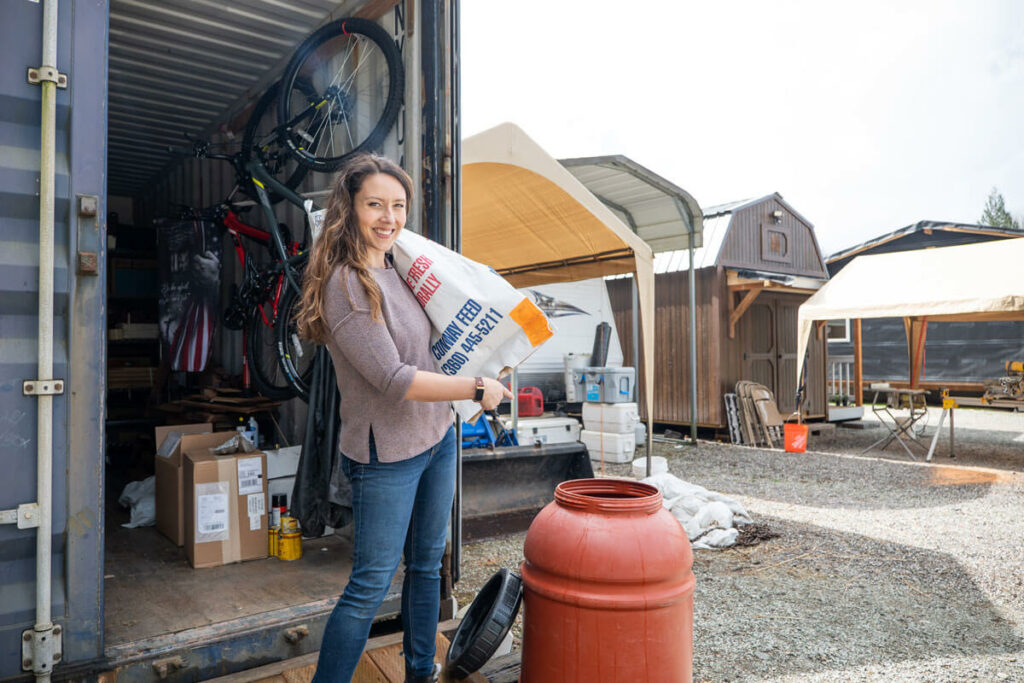
Related Articles You May Enjoy
- Planning Your Livestock for a Year's Worth of Meat (Per Person)
- Stocking Up on Animal Feed (+ How Much to Feed Animals)
- Raising Backyard Meat Chickens
- How to Raise Pigs for Meat
- Raising Rabbits for Meat
- Raising Sheep for Fiber
- Creating a Homestead Business that Makes Money
- Maximizing Your Homestead for Profit & Production (With Joel Salatin)
Melissa: Hey, pioneers. Welcome to episode number 433. Today's podcast, we are going to be talking about raising goats. Now, we've had a couple guests on in the past who talked a little bit about raising goats before, but nothing like today's episode and to the depth of today's guest. In fact, he almost has me convinced to go and get dairy goats, which is a big statement, especially knowing my past history with goats, which if you've hung out for a while, you know about that and then we end up talking about it in today's interview as well, so that is saying something.
Today's podcast guest is Marc Warnke, and he has been raising goats for milk, packing, pets, and meat for over a decade. He is known globally as The Goat Guy, and his profession is homesteading, raising goats, and teaching others to raise goats. Marc lives in Boise, Idaho on Ripple Ranch with his wife, Tricia, and they enjoy working the ranch with the goats to create a global example of sustainable ranching. Marc is the author of two books, one on goats. He has been featured in several documentaries by the BBC, as well as a current long-form documentary by Director Barlow Jacobs.
Speaking of goats and sustainable ranching, today's podcast sponsor is Azure Standard. Azure Standard not only has a ton of resources to help you stock your pantry, but they also have things for animals, specifically minerals and different items for goats, as well as chickens and cattle. If you are a brand new customer to Azure Standard, you can use coupon code MELISSA15 to get 15% off your first order of a hundred dollars or more as a first-time customer. We'll have that in the show notes below, so you can go and check that out. We get a lot of our animal supplements for our cattle through Azure Standard, including the Redmond Agriculture line. They have got a lot of things under their agriculture, so make sure that you check that out, as well as your pantry staples.
Now, the first part of this interview, if you are watching this on the YouTube channel, hello rural internet, you will see that Marc's half of the screen is black for just the first minute or two, and then thankfully, he comes on. Now, if you're listening to this the old-fashioned way, you won't know any difference because all of the audio is there, but rest assured Marc does come on. So without further ado, let's get to today's episode. Okay. Well, Marc, welcome to the Pioneering Today Podcast.
Marc: Thank you. Glad to be here.
Melissa: Yeah. Well, I'm very excited for today's because now, some of my audience has heard me say this in the past and our listeners, but I actually am not overly fond of keeping goats. I like other people's goats, but when we did keep goats, to be fair, this was way back. We were keeping cattle and I had horses at that point, but we got some goats that were old goats. They'd been passed from multiple owners and they were weathered male goats, and we got them when they were quite later in life.
One, there was one male goat that would rear up and strike at me every single time I would go out into the field to move his stake or just to do anything with them. And of course, when he's reared up, he's pretty big, so we did not have a good relationship. I'm like, "Buddy, I don't have time for your antics. I'm here to help you. And if you're going to be a pain, I really don't want to deal with you." And then of course, what goats are famous for, despite having him an electric fence on a stake, they would get out and just decimate our yard and the gardens and would eat everything I didn't want them to eat. That was kind of my goat. They weren't dairy goats. They weren't meat goat. They were very old. We-
Marc: They're [inaudible 00:04:19].
Melissa: ... got them...
Marc: Yeah.
Melissa: Yeah. We got them to help clear some brush area back. And then we got pigs, and I have to say, the pigs were much more efficient for me and I got bacon, so I have not went back to goats. We've stuck to the pigs and the cattle and the chickens and the ducks, but I have visited other people's dairy goats, and they were very nice. So I still hold a slight grudge, I have to say.
Marc: Yeah, no worries. Yeah. I get it. Those are two of the things, if people are set in the right direction, they'll never have to deal with. Goats are consistently a misunderstood animal by agriculture and human beings because they're kind of the redheaded stepchild of stock animals, right? Science doesn't commit any money to them because you can buy a new goat for 50 bucks, so they don't have any value. If that animal was worth a thousand like a cow, then all of a sudden, we would have science and research. But the trendsetter for the understanding of animals is agriculture, and because agriculture looks at only a female goat being of value or a one-year-old wether as a butcher-weighed animal, don't forget the animal you owned, science has never studied how to keep a goat alive over one year that's a boy. Right? They don't know. Not only do they not know, they just guess from other animals.
Remember, goats are incredibly sophisticated and one of the most intelligent animals on the planet. So now, you got super high intelligence, so you have a very complex social and intelligent structure, and then you have an animal that's the most utilized stock animal on the planet. And the only country in the world that's forgotten is America. We're the only ones that forgot. Why? Because we're rich and we can choose to feed animals on a monoculture level rather than a foraging level, and goats can just get by on cheaper ground. That's why the rest of the world utilizes them, is because they can get by. It can take up to six days for the digestive track of a goat to have food go in its mouth, and then come out its butt, so it utilizes so much of the nutrition and translates that into things like milk and meat. It's an incredible resource, but we've forgotten its value.
The two issues you struggled with are super easily solved with a good fencing strategy and proper raising. Goats will get aggressive if you manhandle them. So if you grab them by the horns, you teach them at an age, you can't treat a goat that way because they communicate with one another that way, and you have to show them that you're only the show of love. So we teach people when they're working with their goats that the only reprimand is a squirt bottle or a loud voice, and we put them away from us, and they learn through a disassociative reprimand how to be trained because they're complex. You can't rough them up.
If you rough them up, they think it's fair to rough you up or small human beings and everything else. So aggressive goats are created by rough handling at a young age, which a lot of people think is okay. It doesn't work with goats. It's too close to play. It's too close to aggression. They're very complex. And then they think, "Oh, cool, you're a goat too. I get to play with you that way." And then he's 200 pounds and that's a problem, right?
Melissa: Yeah. That's very interesting because one, like I said, near as we could tell, they were about eight years old. We assume just from word of mouth, and the people we got them from had only had them for about three months, so they'd been moved a lot. But what was really interesting is that goat would never do it to my husband, so he's like, "I don't really know what..." So I was assuming it was an alpha female type thing.
Marc: No. It's that he learned-
Melissa: No?
Marc: No. A lot of times, it's the lowest goat in the pecking order that also shows aggression to small humans because everybody else is kicking his butt all day long. There's a saying in goats, which is goats don't have goat friends, and they don't because they'll go to the feeder, two buddies, twins, and one will beat the other one off the food. Just the same pecking order that seems confusing about chickens but highly developed in goats. So there's this intricate pecking order and you're following into that. When we bottle-feed a baby, they think we're a goat and they think they're a human. We really bond them at one day old to us, so they're super easy to handle, and they're like a imprinted baby bird literally. So we have to interplay with that.
But listen to this, I milk 12 gallons a day twice a day, and I'm on my milking stand between myself and my hired man. Four people can go out and say, "Glitter, Mocha." Two does come right to the gate. We open the gate. They get on the stanchion. The other two does that are on the stanchion get off and go out. We never touch our does in the milking process except to deliver love. We don't have to rope them. We don't have to drag them. They love what they're doing when they're handled well, and it's a beautiful exchange between a human and a goat. I mean, you missed the complexity of the beauty of that animal. I call them an anointed animal, an animal chosen by God that humans are supposed to coexist with. It's the perfect milk. It's the universal milk. I mean, there's so many miracles about this little animal that I can tell you about, and I will twist your head back. They are an amazing critter.
Melissa: Okay. Well, let's back up a little bit. Four dairy goats specifically, benefits of dairy goats, and then we'll get a little bit into requirements for keeping them.
Marc: Okay. Benefits of dairy goats?
Melissa: Yeah.
Marc: Okay.
Melissa: Well, why keep a dairy goat? Yeah. Why would you want to keep a dairy goat? Obviously, for the milk, but a little bit beyond that. Yeah.
Marc: Sure. I rank goat milk as one of the top three foods on planet Earth to put in your body. And that's not me. That's ChatGTP and all the research. So as a proof point to that, actually, before what we did, I put together just a list from ChatGTP. And it'll make it less organic if I'm reading, so I'm just going to go from memory and hit the high points. Number one source on the planet of medium chain triglycerides. Those are MCTs, the same thing that's in things like bulletproof coffee. Most people assume the number one source on the planet of MCTs is coconuts. It's not. It's goat milk. So goat milk is the number one source of medium chain triglycerides. That alone is massive. It's a fat carrier molecule that brings in live enzymes and live microbiomes. It's like putting a supercharged subway in your body in these little fat molecules that only exist in certain things, and goat milk has tons of them.
It goes directly through the stomach, into the brain, into the vascular system, and carries with it super hard things to get like bioavailable magnesium, bioavailable selenium. Selenium is a massive missed mineral in human diet. You also have the perfect mixture of protein and fat. Every animal on the planet can drink goat milk and thrive, including humans. The only closer to human milk is camel milk. You have also a live microbiome, so the gut health aspect. My customers that drink my raw goat milk, instantly, if I get two gallons of raw goat milk in them, their body will demand them to come back and get more, and the goat milk I make tastes amazing. It's so easy to make it taste good and I can show people how. It's so good.
That's the value of goat milk, so why have a dairy goat? So you can access the top food on the planet right out your back door, a gallon a day. I drink three quarters of a gallon a day. I've had four glasses already and I eat one meal a day. I'm 54 years old. I'm ripped. I'm literally ripped, and most of my calories are goat milk. I take my nutrition super serious, and if people do, I can tell you goat milk should be a cornerstone of their diet. Now, as far as care, do you-
Melissa: Yeah. Yeah. Let's first start on space requirements because some people have large acreage and some people that just have backyards, et cetera. I always like to say what is the ideal space requirements? And then what can you get by on before negatively impacting the animal?
Marc: Right. Surprisingly enough, I would say it's about one-tenth of an acre per goat is just a good rule of thumb. You have to remember, when you dry lot a goat, you actually can be more successful at raising them, than pasture raising them because that's an advanced strategy as well. That's where a lot of people go wrong, is that you have to rotate your pastures every 21 days with goats to help with parasites, so most people misunderstand. And don't forget, they choose grass as the lowest rung of something they're going to eat, so if you don't have the pasture with eight different varieties of browse, forget about it. Just dry lot them. And when you dry a lot them, then you can control their food, their mineral, their water, their bedding, and you're going to have a more successful strategy raising goats. I can teach people how to use pastures. As far as space though, my goats have access to five acres all the time and I have 41 goats, and they live on about an acre by choice.
Melissa: Okay. So for dry lotting, for someone who's new, can you explain what you mean by dry lotting? Yeah.
Marc: No access to a pasture. No access to a pasture. They're literally being controlled in their food, and they're living all on one place without access to pasture or forage.
Melissa: Okay. Perfect. When we're looking at goats for meat, for dairy... Actually, we haven't even gotten in too much, but you also do pet goats. Do you have a favorite breed? Can you do this with dual purpose? Is it better to strictly go for a dairy breed goat, if that's your main goal? Kind of walk me through that process.
Marc: Yeah. People come from all over the country to get babies from me. I'm a fully functioning raw goat dairy and breeding operation. I've been breeding and trying to build the perfect back goat for over a decade. We are returning a goat back to its natural origin, and the great part is that we are in our hybridization. We're creating a more resilient milker and liver because we're not linebreeding. Linebreeding eliminates genetic diversity, and when you hybridize, you get hybrid vigor. So I've invested myself more in the goat's overall health and well-being and using hybrids to create udders and conformation that I like to use within my operation. So we're experimenting with this. Gosh, I went down a rabbit trail. Will you remind me where I was trying to go? I apologize.
Melissa: Yeah. No, that's okay. Hybrid vigor. We raised grass-fed beef cattle and kind of the same, we are playing with hybridization with the Scottish Highlands versus some of our Hereford-Angus cross. So when you started talking about it, I'm like, "Ooh, this is really fun." But yes, that's more advanced when people are looking in breeding, so if someone is looking for a breed of goat that's best for dairy, what would your top picks be?
Marc: Where is the crossover? Multiuse. The dairy breeds are really kind of one of my cornerstones because they translate well to packers and they translate really well to milkers. They do both sides of that. And because I know their personalities so well, that's one of the things that's made me uniquely able to understand goats better, is that I do 500 miles a year and 70 days in a sleeping bag in remote backcountry with my herd of goats, including milkers. So I'm living off with my packers off the land. I'm learning their mannerisms. They're reliant on me. I'm a functioning part of their herd.
So what I would tell you is that dairy goats have a gentle way in certain breeds, and if you want certain sizes and certain gentleness, there are certain breeds that I recommend like Oberhaslis or LaManchas or Sables. If you want those higher horsepower, larger productions, that's things like Alpines. And personally, on the homestead, if you want really easy-to-work-with goats, stick to those complacent breeds, Saanen, Sable, Oberhasli, LaMancha, very gentle, kind, nonaggressive, easy goats to work with that'll do everything, including the wethers making meat. I have learned how to cross meat and dairy, putting a Boer with a dairy goat, and I can get, listen to this, a 200-pound baby in 12 months. I can grow faster than pigs. Did you hear that? That's big.
Melissa: That's pretty impressive. That is.
Marc: That's big.
Melissa: It is worth raising goats then for meat. I mean, there's enough literal meat on them to be worth a while as a meat animal.
Marc: We're the only country in the world that doesn't. We're the only country in the world. North America is the only country in the world that doesn't eat goat as a primary meat. They're fabulous. Now, my problem is I dig a good rib eye, so would I ever eat just goat? No because I like a big fatty rib eye and eat one almost every night. But is goat a fabulous meat for a family? No question. Ask yourself this, why is it illegal in San Francisco to have two little Nigerian Dwarves that give me milk in the backyard? They're quiet. They're not dangerous. They'll walk with you as a pet. But it is legal for me to have three barking predators with stinky poop. How is it possible that dogs are legal in my backyard, and two little dairy goats that can contribute aren't? Chickens are now.
Melissa: Yeah. Some of the laws that we have on our books and ordinances, I could not tell you how on earth they came to be. So it makes one question that is just common sense at all within society, but that's a whole another podcast, right?
Marc: It is. It is. Yeah. Yeah. Food sovereignty. Yeah. Yeah. Go ahead.
Melissa: Yeah. Okay. If you are breeding for dairy and not mixing a buck for meat, would you get any type of meat? Say your dairy animal was bred to another dairy goat, and you have that baby and obviously it's a buck, it's a male, so you wether it. What would your meat return look like at a year with that, by half or just kind of varies?
Marc: Usually, a standard person who's not throwing huge amounts of feed and using an advanced strategy, just raising their baby goat out of my breeding crossed with meat will be in about 150 to 200-pound range, somewhere in there by 12 months old. That's going to be butcher weight.
Melissa: Okay. Awesome.
Marc: Which is a lot.
Melissa: Yeah. No. Actually, I'm a little surprised at that amount, to tell you the truth, in a year. I'm like, "That's really good." Back to the bucks, I mean, what are the benefits and the drawbacks to keeping a buck on your property for breeding purposes? Do you really need to have a certain amount of does to the buck ratio? Or just walk me through that process.
Marc: I personally don't keep bucks on my property. I use a breeding strategy where I'm always producing a breeding buck within my own genetics, and then pulling in outside genetics when I need to mix in new stuff. The beautiful part about a goat is it can breed when it's four months old. So what I do is I actually raise up a buckling for the year. I'll pick five, and then I pick the one that I like the most out of my five, and then I'll breed him to does. Or if I want to accentuate my others, as soon as they're done breeding in September, they're about nine months old, I castrate him and then I turn him into a packer for me, but people could turn them into a meat goat or a pet.
Melissa: Okay. How long is gestation period of a goat?
Marc: 150 days.
Melissa: Oh, okay.
Marc: Yeah. We like to breed late November, December because we like those babies to hit the ground in the late spring, so it's warmer. And the average goat has 2.4 babies, so they're quite productive too. Think about it. I have way more triplets than I do singles, so when you add a third axis, now all of a sudden, you get geometric progression with those growth rates because when I can hit three babies on the ground and get those growth weights, the only thing that can produce me is a pig because she's going to have more babies. Right?
Melissa: Yeah.
Marc: So if you think about it, that's in the factor too. That's why they're a better choice than a cattle is, well, a cow as well, just because they'll produce more for the average unit.
Melissa: Yeah. That's really interesting. Now, I'm guessing probably not as much just because we've talked about goats are severely underutilized in the US, but if you didn't have a buck or you were looking for new genetics, is there any type of AI programs out there available for those?
Marc: Yeah. Yeah, totally, but that's for the fancy farmer. I mean, you can do that and that's super good, but there's so much great almost older genetics that are out there. I mean, there's a breed of Spanish goats out of Texas that for 50 years has been thrown out there, no worming, no hoof trimming, no assisted birth, nothing. It's a herd of 200 goats that spit out 400 babies every year and they go catch them, and they live in Texas. So you have to remember the range of ground that they can live on. There are people who are really doing exceptional things. Now, I know how to grow goats big. I know how to play the meat goat business, and I teach people how to do that, but at the same time, it's translatable. So that's the only sector I don't feel like a complete expert in, but our whole thing is...
You have to remember homesteaders last year voted on the most difficult animals to raise on a homestead. Goats were number two. You know why? Because there's no resources. There's no help. And if you go to Facebook and go, "Hey, what do I do about this," you'll get 15 billion answers and eight people arguing about who's wrong? There's no good resources, so that's why we built Packgoats.com, is to have courses on helping people build a milker, helping people raise a baby, helping a goat have a baby. That's the one.
I'm telling you the heartbreak that I get. I get emails from all over the world all the time, and the heartbreaking is moments of birthing. Helping a goat have triplets is hard. It's hard for her. She doesn't know what she's doing. And if you think at 3:00 in the morning, a vet's going to show up, he ain't. You need to know what to do. So that's a course. I literally tell people it's free if you can afford it. Please save yourself that heartbreak. It's 70 bucks. A vet bill is $280 to start. So get some education. Learn how to raise these guys, and I promise it's super simple if somebody shows you, but somebody's got to show you.
Melissa: Yeah. Well, to your point, Facebook is one of those love-hate relationships, right?
Marc: Oh, yeah.
Melissa: Sometimes you can get some really good help and advice there, and other times, especially when you don't know yet what you don't know and don't have that discernment, it can be a scary place.
Marc: Yeah. It's super important that people know this, veterinarians. I'm not here to throw veterinarians under the bus at all. They're beautiful people. They don't make very much money. They're super overworked. And everyone that shows up to my ranch, I make them a sandwich. They are kind people trying to do their best. But the reality is a large animal vet showing up to your door to work on your goat took six days in school, six. That's how little we value goats. And if you go into a stock supply store, the stock supply store clerk is going to assume, everybody else assumes that the closest related thing to a goat is a sheep and it's not. It's a cow. So if you're trying to mix things that you give them, you select cattle stuff because cows have so much research in science that we actually borrow their drugs to work for goats, and vets can't prescribe that stuff. It's off-label, right?
So they come and they say, "Oh, your goat has coccidia." Super easy fix, off-label, SMZs works all day long. They can't tell you to use it. They tell you to use CORID, which is the only thing science has approved for a goat in America, and it's awful for them. It's awful. It's the only thing they can suggest. You have to give them vitamin B shots, that they don't fall into goat polio. It's so hard on their systems, and that's our number one recommendation by vets. It's like that. That's why we have to bridge the gap in this company, and that's what we're trying to do.
Melissa: Well, that is wonderful and I'm with you. My heart goes out to the large animal vets because there's so few of them left. I mean, 20 years ago in my area, we had two or three to choose from, and now, there's only one large animal vet clinic and there's three that are sharing different days to just keep it going. Yeah. There's a lot more small animal vets, of course, like cats and dogs. They're all over. And I don't think that a lot of people don't know until they get into agriculture or keeping animals. They don't even realize those vets don't treat your livestock animals.
Marc: No. No. Well, not only that too, the availability of the Rx nowadays. Now, we got to get prescriptions for everything. People who are new to this don't realize, that just showed up two or three years ago. I used to be able to go to the stock supply store, buy penicillin, SMZs, all that stuff. So I teach people how to build a relationship with vets because between our programs, if you could just access a few... So I teach people have medicine cabinet, how to build a relationship with a vet, and then have the couple chemicals in their medicine cabinet, that if they have a problem, when they call me, I don't have to say, "Okay, do you have any antibiotics?" "No." "Okay. Now, you need to call a vet..." And hopefully, he shows up to your baby who has about four days to live without an antibiotic. Do you know what I mean?
Melissa: Yeah.
Marc: That's how it is, so we're trying to help people to be preemptive and learn that stuff.
Melissa: Yeah. Yeah. No, that's good. I mean, this was kind of a side note, but really with goats obviously, but really any large animal if you've got them, to get established with your large animal veterinary clinic in your area before you ever need them, that is really key. Yeah. So great point there. Going back to the goat milk, however, because I find that very interesting. I didn't know actually some of those stats that you shared on goat milk. I actually happen to love goat milk cheese. I love the flavor. It's my daughter's favorite. She loves goat milk cheese. But goat milk itself to just drink has kind of a bad rap. A lot of people say, "Well, it tastes goaty." So one, why is that, and is that something that can be altered by the way that you handle the milk or that the goat is being fed, raised? Can you prevent it from having that goat taste to the milk or is that something that you're going to kind of develop your taste buds to?
Marc: Nope. You can absolutely make goat milk, so you almost can't discern it between whole cow's milk at the grocery store. Remember, it's naturally homogenized, so it has really small fat molecules, so the cream doesn't separate. You sometimes will get a thin layer of cream on the top, but it's actually quite hard to harvest the fat out of which is its magic. Right? So things like butter, things like cheese, if you do a gallon of milk, you're going to get a little hard ball of cheese, with a whole bunch of delicious way that you need to figure out what to do with, to swap with your pigs or do whatever.
The reason people ask that question so often is they're kindly saying, "Hey, I tried goat milk and it tasted like crap last time, but I loved goat cheese." What does that taste like? Right? So how do you make that there? So what I would say is that as people see or become aware of the value of goat milk, there won't be any fight because yes, I can teach them how to make it taste amazing just like whole cow's milk, and it's all in the aftercare. So certainly, it's the health and nutrition, and we pay attention to every detail, including our goat and our people's happiness. We want our goats to be...
I milk 14 gallons a day with a homestead. Right now, I'm five months into my milking season. I haven't had one case of mastitis. Why? Just good care, good care. Healthy goat, healthy bedding, easy to take care of, and we have no problems. Mastitis can be a pain in the tail. It's all about cleanliness, so precare is really important, and your mastitis rate is indicative of your care. It's like your little measure stick. Do you get it, right? Next is postcare, how we prepare the udder, how we sanitize the surface of udder because it's the coliforms that grow in goat milk. The healthy bacteria that makes it taste bad is actually growing, so we keep that in stasis in the most low level, so it doesn't affect flavor. But a true connoisseur of goat milk would enjoy a goaty glass because it's actually more healthy because it's grown. It's more alive.
Remember, lactobacillica is in goat milk. Lactobacillica is a bacteria eating bacteria. It's a self-stabilizing agent. So it's like honey, another anointed food. So it's a hunter killer and it works once you take it in your body as well, but what it does is it makes goat milk stable. Now, I'm going to say this with caution. I'm this kind of guy. I like to experiment. I kept a glass of goat milk on my counter for three years at room temperature and then ate it, and it was yogurt. It was delicious. It actually has the capability to self-stabilize, so as it's getting more goaty and flavor, it's actually more healthy.
Now, that said, who wants to drink goaty? It's nasty to me too. It's all in the cooling process after. I chill my milk with a brined ice bath, and I can get it down to 38 degrees within 20 minutes after it's out of the udder, and then it's frozen solid the next day. It's one day fresh in my freezer whenever I want it, and it lasts a long time. And that's how I use my customers too, so now I don't have milk rotting in my refrigerator, hoping some people will come grab it. It's frozen and ready for them one day fresh. I have a freezer out here on my front porch and two in Boise, and I do 6,000 a month in goat milk sales with 14 does.
Melissa: Wow. Okay. So when you freeze it, and then thaw it... Because cow's milk gets kind of grainy, right?
Marc: Mm-hmm. Yeah.
Melissa: So does goat milks, because it's naturally homogenized, you don't get that graininess once you've thawed it?
Marc: Correct. Occasionally, I see little specs of fat molecules in it, but it's never a texture or a problem issue, but it actually unfreezes beautifully. Again, I have almost well, 80 some gallons a week of customers in Boise who have never drank goat milk, most of them, who are scrambling, and I have to tell people no, at $20 a gallon. I sell my goat milk for 20 bucks a gallon. How many of your listeners who would be a huge difference if they could just make two grand more a month? And that's what I teach in homesteading, is that if you can learn how to make your homestead make some money, then you get the greatest gift, which is a hired person. Now, when I have somebody else who I can rely on to do the daily things, now I don't have the golden handcuffs of my homestead. I actually get to go on a trip every now and then, and go in the backcountry. So I teach people to not have their homesteads own them, but for them to own their homesteads, and to have at least produce enough profit through something creative.
Remember, the city people want what we have desperately, desperately. Fill them with love. Bring them to your ranch. Be kind. Be grateful. Give them some goat milk. Give them some vegetables. I think it's homesteaders who will be part of changing this problem we have, through using a stewardship of land. It's our gift. We're a small portion of the world that owns land. We should share. We shouldn't look at it ours. We should look at it as ours. Right? That's kind of how I approach things in everything.
Melissa: Yeah. Well, to that point, not only can it bring you extra income, but being able to provide a job for someone else with something obviously that we believe in that is good, that is regenerative type practices that... Anyways, yeah, this could be an... Again, we could have a lot of podcast episodes together.
Marc: I'd love to.
Melissa: But that is a really beautiful thing too, to be able to provide a job someone, especially in today's economy, that can be something that they can take pride in and feel really good about doing, that they're giving back while getting paid to do so. That is powerful all on its own. But I do have a question with yes, because goat's milk is naturally homogenized, is there a way... I'm assuming it would probably be something mechanical. If you wanted to separate the cream in order to make butter with goat's milk, are you-
Marc: Oh, you can.
Melissa: ... able to do that? You can do that?
Marc: Oh, for sure. For sure. Really, the way I look at it is there's lots of ways to take in your fat and protein, and you can morph milk into a hundred different things, including bases for soup. I use goat milk in a ton of things. Most people try to get creative with goat milk because they make crappy tasting goat milk, and then try to get creative with it. So what I find is that when you get good tasting goat milk, you'll just realize it's in its purest form made by God in this moment, and you will covet goat milk because your body will beg you to put more of it in there. Your live microbiome is going to be back in check. Number one, producer of serotonin and dopamine, your stomach, and all of those are messed up. So if you get live microbiome, quit that leaky gut, do all that different stuff. That's one of the cornerstones, health aspects of goat milk is gut health. It goes in and repairs and does all its magic. I'm telling you, it is magic.
Melissa: Okay. I like this. Back to the milking, I know you are milking that many goats a day. So for someone who's just said they have one, maybe two dairy goats, do dairy goats require a milking stanchion or is that part of however they're trained to milk?
Marc: It's such a simple thing to add to your arsenal because I have kits that'll spell it all out for you for 15 bucks to build a stand yourself. It would be short. You would be thinking in a short way to try to do it on the ground because you're stooped. To raise a goat up and to be able to reach your udder and to... Once you learn the process of hand expressing a goat, you're fast. You can empty your udder in about five minutes. So if people had two goats, it would be about a total maybe of a 20-minute chore in the morning. And remember, goats are one of the only animals that you only have to breed once, and they will milk the rest of their life. Cool, huh?
Melissa: Really? I was going to ask you what their lactation period was. So their-
Marc: Their whole life, it's supply and demand.
Melissa: Really?
Marc: Yep. I can even get a dose started. It's bred well to spontaneously start producing milk just by creating demand. So I've seen many goats over 10 that have never had a baby and are high-producing lactation. Pretty cool.
Melissa: That is fascinating actually, wow.
Marc: They'll just spontaneously come into milk. Actually, the problem with dairy goats is they're difficult to dry up, especially these high level producers. Do you know they have goats that can make three gallons a day? Three.
Melissa: That's impressive. I know I didn't. I didn't know they had that type of volume, to be honest.
Marc: Right. Yeah, coming out of two teats. Now, it's more simple. The other thing that homesteaders got to think about, a cow sounds great, but do you want to deal with a piece of poop that's like a mud pie this big coming out of that animal's butt in a small pen, in a small operation regularly? It always ends up soup, right? Sorry. Oops.
Melissa: Well, I have to say my dairy cow, I only have had one dairy cow, but she only once defecated in her milking station. She was really good and it was because she saw us moving the cows and she wasn't with them, and let us know she was displeased.
Marc: She was excited. I guess I wasn't speaking about it on the stand. I was speaking about it in terms of care. If you go into a dairy cow operation and tour it, and then go into a goat dairy operation, you will be blown away at the overall joy index and cleanliness and stink and flies. The only difference is the poop. It comes out of a goat in a little ready to go hot on the garden composted six days digested little berry. So it's just an easier thing to deal with is the defecation aspect. So instant compost, really easy to clean, not poo soup, those sorts of things is another component to think about in a value of a goat.
Melissa: What other supplies are necessary for raising dairy goats?
Marc: The great news about the supplies people need to raise dairy goats is a stainless steel bucket, really, and then the funnel to filter the milk, so it's nominal. If people want to go basic and hand milk into a bucket and then put it in there, strain it, and then drink it raw, I did that for six years. I know what that's like. It's really cool to hand milk. It's cool to get intimate with a goat in that way, where every morning she relies on you. You rely on her. It has a regular schedule. It's cool, but you are now married to an udder, so you have to remember that part, right? But in terms of equipment, it's minimal.
There's actually more investment in learning than there is about equipment. That's the nice thing is goats are such cheap keepers. They need a feeder. They need a water and they need mineral. And then you got to check parasites, trim hooves, and that's kind of daily maintenance and they get a vaccination shot every year. But once again, most people don't do those basic steps, right? Then they build problems into their goat, then they call the vet, and they have all those situations. So usually, getting people started right first is the best path.
Melissa: Okay. So can you raise just one goat or should you... They're more of a herd animal, so I'm going to make an assumption here, which we know how that can go, that it's probably best to at least raise them in a pair.
Marc: Yeah. Actually, it's even more sophisticated than that if you start to understand goat psychology. Certainly, goats always need a friend. They will associate with a chicken or a horse or a cow if they don't have a friend, but they prefer a goat, so it's super important to give them a buddy. It's like they're so herd bound that it's part of their infrastructure. That's why so often, breeding bucks are taken care of so poorly because they're isolated and live alone. They die in about five to six years, and literally, I think they kind of go crazy because they're being put in that situation. They're that way.
The other thing is when you bring any new goats into your herd, do they need to be brought in, in pairs? If you bring in a single into your herd, what will happen? Everybody will gang up on that one and they'll never have a friend, and they end up being kind of the solo weirdo that has no way. Now, I experimented over the last decade and I've learned how to take one goat, put them in a pen with another one, and then isolate them together, so they have to bond. And that's how we've intermixed with just a single into our herd that gets along well and is happy. But yes, you need to. It's very important for that.
Melissa: Okay. Now, back to the fencing because I think that's one of the major problems that most people have or talk about with goats. What is your, I guess, best type of fencing for your goats?
Marc: Okay. Just remember that three strand barbed wire is futile. They'll walk right through it, so will the does, and they'll tear their udders and everything else. So you have to use some form of field fencing or electricity. I prefer horse panel. Horse panel is a two by four square. The benefit of that is the babies can't stick their heads through if you're going to leave their horns on, and then get stuck. If you do the two by four grid on the bottom, babies can get their head through that. That's your traditional field fencing. So you want to use at least horse panel on the bottom, or literally, if you'll have a goat every year, you have to put the stick of shame on because he's sticking his head through, and then can't get back out. Right? That's a pain in the butt, so that two by four grid woven does great, but you want to keep a goat off your fence, both trying to get the edibles on the other side and rubbing down the length of it when they're losing their fur, when they're molting.
So you want at least one brand of electricity about mid-level, and then you want one on the top, so they don't feel comfortable to stand on it. That's the magic recipe for goats you'll never have an issue. If you don't have enough money and budget, then electric fencing is the best. The critical part is that you run every wire hot, as opposed to the systems a lot of people do, which is hot ground because now, they have to touch two to get the shock, as opposed to every wire has a live shock. And goats respect electricity like no other animal, literally. Once they know that's something, they will never touch it again.
The most problem that people have is that as a goat puts its head through, if it has horns, the top wires, the hot, the bottom wires, the ground, and it rubs across the top of their horns. So they don't complete the circuit because there's not enough electricity to go through those horns. So when they duck through, their horns are the first thing to touch the top, and they're not that conductive, and when they do get shocked, they burst forward through it. So a lot of times, the early exposure, I like to watch and see what's happening, but as soon as they get one or two shocks, you've got no problems. Electricity keeps goat owners happy. You will have no issues. The problem with electricity as you know as a homesteader is keeping it working all the time is a pain in the butt. Right?
Melissa: Yeah.
Marc: Yeah. Yeah. So that's the negative of it. Horse panel does great.
Melissa: Okay. Good. Beyond dairy and meat, are there other benefits to raising goats?
Marc: Yeah. One of the things I tell people regularly is, "Oh, by the way, the thing you're not counting on is that you will likely love these goats more than your dog." And the amount of emails that I get back that tell me that that's true, I would gauge honestly that it's 75 to 80%, when they're fanatical or loving dog owners and they get a goat, there is so much exchange and energy difference in a dog and a goat because a goat's content and happy with two interactions to one interaction a day. A dog needs more, right? So the interaction and the amount of pain in the buttery of owning a dog and how much time and a goat and how much time, goats for me balance better, and they're so developed and loving that once you give a good goat the chance to get to know you, you'll realize they're crazy, intricate and beautiful animals.
Melissa: At this point, if somebody is still on the fence about implementing goats into their homestead, what would be your best piece of advice to convince them to just do it?
Marc: Well, honestly, I would feel inappropriate if I convinced somebody to buy a goat. I think that I would more rather present the information, and then let people settle into whether it's right for them and their walk. Goats end up becoming a lifestyle. They really do. They end up becoming some sort of an anchor on your homestead, but if you have a homestead and you have animals, you already have other anchors. They could be complex to learn and you're going to have to commit yourself to the process. I mean, I want to be realistic because if I'm unrealistic, then the thing that pays the price is the goat.
I want people to know what they're getting into and know what they have to do on a budgetary level, educational level, and that's what we provide on Packgoats.com is just here's what you're getting into and make sure you kind of talk to somebody who actually knows what they're talking about, what you're getting into, number one, and are you willing to do that because the loser's going to be the goat if it doesn't work? You're going to have to figure your way back out of that. So how do we stick your toe in the pool? How do we see what you do and what you like and whether this works for you? And then how do we help you progress down the path?
So for me, honestly, on the homestead, due to size, temperament, sophistication, the donation to the land because remember, their utilization of the land works much better in sustainable ranching because I can pasture segment and their poop goes into compost quicker. Their gentler on the land, don't compact the land. They're browsers rather than mono grazers. There are all kind of reasons to own goats over cattle. Once again, I'm not downing cattle, but it's worth looking at. And I think homesteaders should just feel free to explore it, not just from me, but from other people, but I would really caution you not to listen to somebody who had a goat experience that didn't actually have goat experience.
Melissa: That would be me.
Marc: And I love you and you're fine, and I'm not being critical, I promise.
Melissa: No. I'm fully aware. I was inexperienced going into it. Yeah. Yeah. No worries. Well, for those who are like, "Okay, I definitely want to learn more about goats, go down that path," you mentioned your website, but where are the best places for people to connect with you and to find out more about what you're doing in your teaching?
Marc: Well, that's really kind of you to ask. We continue to hold the energy that our thing is to help first, and if money comes our direction, then that's the blessing, right? I have 400 free videos, I think is what I'm up to right now on the YouTube channel, with about 30,000 subscribers. So people can find us there on Packgoats.com. Facebook is another place I kind of hang out. I have a group called Pack Goats, and I also have my personal thing, and a lot of people follow me there, but it's fairly similar to Instagram. I just flow things through Instagram. On Instagram, we have both business channels as well as personal. You can follow me personally @marcwarnke on Instagram, and then @pack.goats on Instagram. And then we'll provide you with a full spread of these in links.
And I would tell people that the epicenter of where we work is in YouTube and our website. Between those two resources, we're able to put together literally hands-on video tutorials where we're showing people how, as simple as a thing, as how to take a temperature on a goat. I show you how to put it in their rectum, and people honestly get confused on that. So I literally have courses with 45 chapters, how to give a shot, how to drench them, how to assess, how to diagnose, four biggest things that kill babies. So there's almost no subject, and our courses are all live, so meaning, I go in and I inject. As new technology and new techniques work, I'll replace chapters, so they've evolved and gotten better over time. And all our courses are free once you purchase them for the rest of your life, so they're always accessible. So it's a really good value. I don't have a course really over 200 bucks and almost all of them are less than a hundred bucks, which is the cost for one vet visit.
So that's where people need to find us, is the websites, resources, and I'm still somebody who picks up the phone. People can call me. I hope I always have that time. I feel like I'm getting at the edge of not, but I also have beautiful people that are on my network that can help people when they contact us, to evaluate their goat and help their goat.
Melissa: Yeah. Awesome. We'll make sure to link to everything in the blog post that'll accompany this episode, as well as show notes if people are watching it on our YouTube channel or listening to it. I say the old-fashioned way, but just listening to it through headphones on a podcast app. Marc, well, thank you so much for joining us today. I learned a lot and this was really great, so I appreciate your knowledge and your time.
Marc: Oh, thank you so much. Our whole mission here at Ripple Ranch is to ripple out kindness, love, and gratitude. I can tell you hold some of that same energy. I've looked at your material. I'm grateful for you in helping us to have more people who know what we're doing, and I'm really grateful.
Melissa: Yeah. Well, I hope that you enjoyed that episode as much as I did. Marc and I got to talking so much, we forgot to tell you that he has a new book on goats available for preorder. It's Modern Goat Packing. So if you are interested in that, we'll make sure have the link below this in the show notes, as well as the blog post that accompanies today's episode, which you can find at melissaknorris.com/433, just the number 433 because this is episode number 433. I will not be on here with you next week with a new podcast episode because I will be in Idaho at the Modern Homesteading Conference, so we will be taking a break from the podcast next week, but I look forward to being here back with you in July and getting caught up. So until then, blessings and mason jars, my friend.
Sign up to receive email updates
Enter your name and email address below and I'll send you periodic updates about the podcast.
